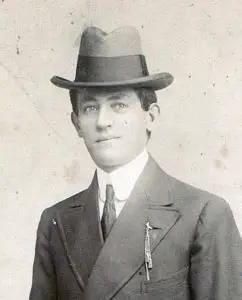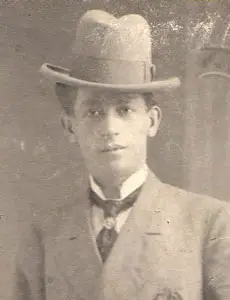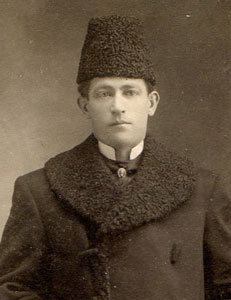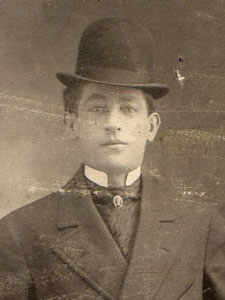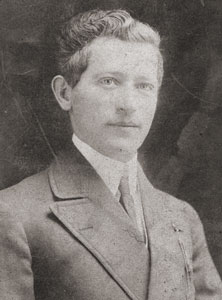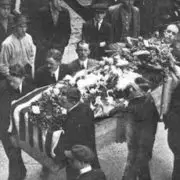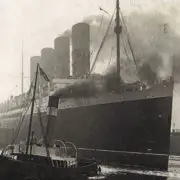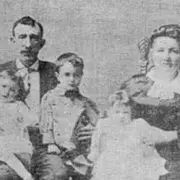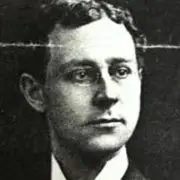Lusitania : Passengers of Distinction
Stories of some notable Lusitania passengers.
Douglas Hertz
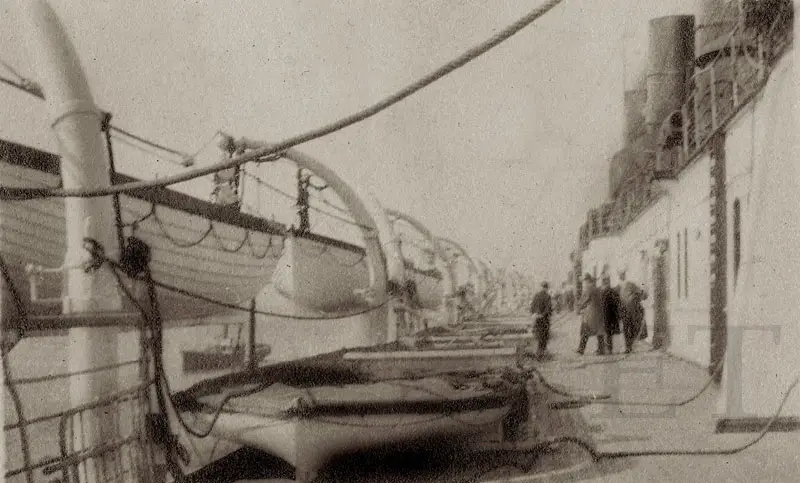
Photograph taken 24th April 1915 showing final configuration of the boat deck
Douglas Hertz, Lusitania survivor, may well have led the most colorful post-disaster lives of any of the passengers. Newspaper columnists loved to profile the likeable bon vivant, and Mr. Hertz was apparently not shy about supplying them with fresh copy.
Hertz was born in England in 1893. He would later tell reporters that he ran away to sea as a youth, and made two voyages, one as a cabin boy on a ship bound for Africa, and one as an oiler. He then settled down in a respectable position as a correspondence clerk at his father’s wholesale chemist and druggist business in London.
Douglas saved his money and, he would later tell reporters, traveled to the United States in 1910 seeking adventure. He aspired to Broadway success, but instead found himself as part of a touring group. He studied for the bar while living in St. Louis, Missouri, and after passing his exams in 1913, spent a year as a practicing attorney.
Hertz would claim that patriotism, and a desire to avenge the deaths of two of his brothers in the war, placed him aboard the Lusitania’s fatal voyage. He traveled in second class.
The moment that the explosion occurred, I got up from my seat and made for the deck. I had hardly taken a dozen steps when the second torpedo struck us with such force that I was knocked off my feet.
I made my way on deck as speedily as possible, and there I found everyone doing what they could to get the women and children into the boats, but unfortunately it soon became apparent that few if any of the ship’s boats could be successfully launched, as the vessel was listing so badly to starboard that the port boats hung right in over the decks and the starboard boats were swung out so far that it was nigh impossible to get into them.
I grabbed a half dozen belts from the first cabin I entered and returned to the deck to give them to women and children. Altogether I must have made six or seven trips below, bringing up lifebelts, before I realized how fast the boat had been sinking, but the last time I came up I had lifebelts in my hands and found nobody aboard to give them to. Then it dawned on me that I had but a few seconds in which to get clear, and for some reason that I have never been able to explain, I forgot to put a belt on myself but dropped all six on the deck and jumped overboard and set out to swim away from the ship.
I knew that she might sink at any moment and swam for dear life for the first minute or two without looking back. Then I turned on my back and witnessed the most tragic sight of my existence. The great vessel had gradually sunk by the bow until she was completely submerged to the fourth funnel, and she was now turning over, her starboard rail now being under water. Then, without warning, she lurched, hesitated a moment, turned over and was swallowed by the Atlantic.
I turned away from the terrible sight, and swam to the nearest piece of wreckage, climbed upon it, and sat there for eight hours until I was picked up by the patrol boat, Julia, of Queenstown.
Douglas Hertz was atop the same overturned lifeboat as Cyril Wallace and Belle Naish. Mrs. Naish sat beside Mr. Hertz, and would later testify that he signed his name to her shoe so that she would not forget it.
Douglas Hertz enlisted, and was granted a commission as second lieutenant in the South Lancashire regiment. He recounted that he saw action in the Dardenelles, and spent time training recruits. Suffering from “nerve paralysis,” he resigned from service at some point in 1916.
Details regarding the next portion of Hertz’s story are hazy, but during the summer of 1916, he returned to the United States aboard the New York, bringing with him his wife, Mollie, and infant daughter, Mary Madeleine. He also brought with him a motion picture, Fighting For Verdun, that he had produced.
Hertz passed his next few months promoting his film. A small article in the New York Times features Captain Douglas Grant Hertz informing an audience before on screening that he had personally seen the German submarine Bremen captured and brought to port in Wales prior to his departure for the United States. Reviews of Hertz’s film reveal it to have been a documentary, the principal flaw of which was a lack of either fighting footage or Verdun footage. Fatal omissions in a film titled Fighting For Verdun. The review in Variety quoted an audience member as telling Captain Hertz that she really enjoyed the orchestration that accompanied the screening.
Hertz then did film work at the various NYC area studios, appearing (unbilled) opposite Marguerite Clark, Pauline Frederick and Elsie Ferguson. He worked at Liberty Bond drives, as well. 1918 found him serving as a machinist’s helper at the Morse Dry Dock and Repair Company, in Brooklyn, NY. His Lusitania experiences, and autobiography up until that time, appeared in the company’s in house magazine, Dry Dock Dial, in October 1918.
Douglas Grant Hertz entered the United States in 1921, aboard the ship Panhandle State. He listed his occupation as publisher. The purpose for his trip to England has not been determined.
To capture the flavor of the rest of Hertz’s life, a newspaper column from 1940 serves best:
Served as a Captain in the British Army…was on the Lusitania when it was torpedoed…saw action in Gallipoli campaign…managed the negro heavyweight champion Jack Johnson…dropped a fortune trying to organize a Pan-American oil cartel…acted in silent movies opposite Marguerite Clark…has raced turtles in Miami and pigs in Los Angeles… introduced dog racing to Staten Island…recently completed a deal with Turkish Army for 20,000 donkeys…tried to buy the famous Tombs Prison and turn it into a wax museum…drinks only champagne for breakfast…dines chiefly on fowl…is president of a music publishing firm and owns a swing band… is now producing a Latin American film on Long Island…is a real estate operator…owns the Pegasus Polo and hunt Club at Rockleigh, New Jersey… club has sanctuary for famous old mares and stallions which have made names for themselves in theatrical work… one of these was Anna, a mare who carried the late Valentino through The Sheik…Anna died there recently and was interred with honors. Anna was also famous as an opera star…owns a nightclub named after the horse Sun Beau….great love is polo…says he will bring the son of the late Will Rogers and his polo team east soon to compete at Pegasus….dreams of a vast chain of polo fields from coast to coast “So polo can become the average man’s pleasure rather than the rich man’s fun.”
Mr. Hertz has recently been dubbed “Barnum on Horseback” by his press agents. They like to refer to him as “A cosmopolite Paul Bunyon” which no doubt he is. Certainly at 60 he defies analysis. He says he sleeps only three or four hours out of twenty-four, and consumes strong spirits at a rate of two quarts daily. His arena at Pegasus is said to be the largest indoor arena for rodeo and polo on earth. Actually, it is a vast airplane hanger which Mr. Hertz transferred to Rockleigh from Floyd Bennett Field. “My losses” he admits casually, “are about ten grand a month, but then what’s ten grand when you’re having fun?”This statement perhaps explains him better than anything anyone else could say.
There are several such articles about Hertz’s alleged frivolity, that span the final thirty years of his life. What is not contained in any of the copious press coverage, is exactly how Mr. Hertz made the jump from shipyard worker to beloved member of the New York area polo set as quickly as he did.
There are many serious articles about the man as well. He owned, for a time, the now-all-but-forgotten New York Yankees football team. He and a partner made a killing when they purchased the unwanted collection of U.S. Patent Office models, some dating back to the eighteenth century, and began direct marketing them thru the Gimbel’s Department Store in New York City. Among the first items made public was a patent applied for by Abraham Lincoln in 1849. Hertz quickly sold the model collection to a group of investors for $75,000.00, who were left holding the bag when interest in the curiosities dried up and sales collapsed. He offered NYC $850,000.00 for the slated-for-demolition Tombs prison, which he hoped to turn into a “museum of crime” in time to cash in on the 1939 World’s Fair: the offer was rejected.
Mr. Hertz was married at least six times. He mentioned, in 1915, that he had a wife and child in St. Louis. This could be Mollie, and Mary Madeleine, who returned from England with him in August 1916, although Mary is listed as being an infant on the voyage manifest. He later spoke of a wife who died in a train wreck. He entered the United States aboard the Aquitania, in 1938, with a wife named Modette, of Fort Cobb, Oklahoma. His immigration records from that voyage state that he became a U.S. citizen in 1937.
Douglas Hertz died in Novato, California, on November 28, 1967. His obituaries recalled him as a fun loving individualist who enjoyed polo and spinning a good story.
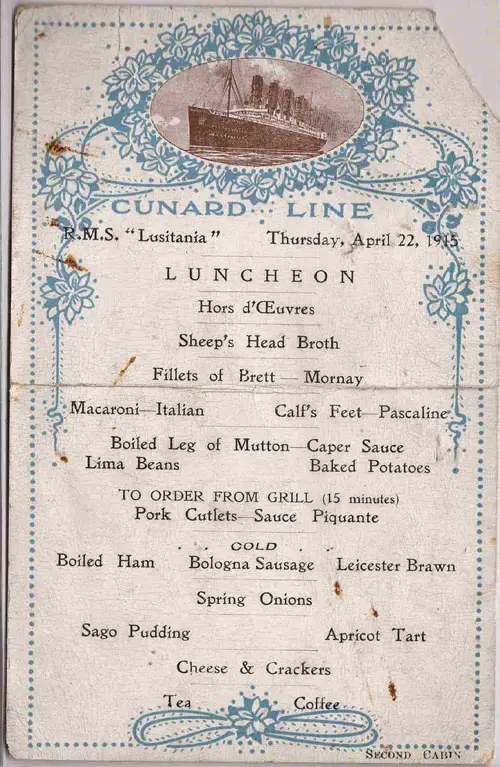
A menu from the Lusitania, April 1915
Dorothy Connor and Howard Fisher
“How wicked of me to drown when my mother needs me in Oregon.” These words echoed through Dorothy Connor’s head as she was dragged down by the sinking Lusitania. How did the Wellesley Graduate, on her way to help with the war effort, end up in such a precarious situation?
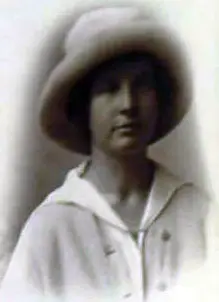
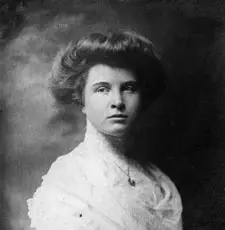
Dorothy Connor
Miss Connor lived the sort of life of which films are made. A typical well-to-do young girl of her era, her war experiences matured her into a purposeful, resourceful, and adventurous lady, and hers is among the most endearing of all Lusitaniabiographies. She was born in September 1890, to Charles and Katharine Connor of New Albany, Indiana. The Connors lived in a large Victorian home they named “Daisy Farm,” and led a prosperous existence. Dorothy attended school in Germany during an extended family trip abroad. Dorothy’s older sister, Sara Katharine, married Dr. Howard Lowrie Fisher, Dartmouth graduate, and Dorothy’s son believes that, as a five year old, she served as the flower girl.
Katharine Connor moved her family East, to Rye, New York, after her husband’s death around the turn of the century. Dorothy attended prep school, and was accepted to Wellesley, where she pursued a History degree. She was active on campus beyond her studies, participating in activities ranging from theatre to an eating club. She was a member of the Phi Sigma Sorority. She planned to become either a secretary or a teacher upon her graduation in 1912.
Katharine and Dorothy Connor moved together to Medford, Oregon, where one of Mrs. Connor’s sons was a successful orchardist. They bought a 55 acre farm in the Rogue Valley, and built a home there which they named “Sundown Hill.” They became active in Medford society: Dorothy took part in Society Vaudeville with golfer Chandler Egan as her partner. A photo of the two dancing together is on file at the Southern Oregon Historical Society. She jokingly wrote to friends at Wellesley, “I haven’t even taught Sunday School. I have no occupation, but I am very, very busy.”
But, the young woman was about to take her first steps towards independence. Dorothy had earned her degree in first aid by 1915. Her sister, Julia, was living overseas with her husband, the future Sir Harold Reckitt, and Dorothy, interested in helping with the war effort, decided to travel abroad and utilize her skills. Dr. Howard Fisher, her brother- in- law, was going overseas, and so it was arranged that the two would meet and take the next available ship- the Lusitania. They booked two inside cabins, E-50 and E-63, on April 28, 1915, for $285. Katharine helped Dorothy pack, and lent her a suitcase and a trunk. She told her mother, in jest, that she was, “afraid something might happen to them.”
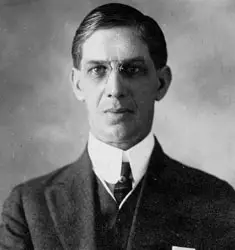
Howard Fisher
Dorothy Connor and Howard Fisher arrived at the pier early, on the morning of May 1st. Fellow passenger, Thomas Home, recalled that there was a lot of baggage and that tickets were being thoroughly examined as people boarded the ship, which he believed caused a slight delay. Dorothy sent her mother a color portrait postcard, from the ship’s writing room, labeled Lusitania and Mauretania. She wrote: Expect a cable before Saturday or Sunday as we are not due in until Saturday. I thought it was Thursday, but since they have no competition it seems they don’t have to hurry! It is now eleven-thirty and they haven’t started yet though I don’t know why. I wish they would, it’s a rather chill, damp day…Dorothy.
Miss Connor went on deck to learn the reason for the delay but, after talking with a few people, did not find a conclusive answer. She returned to the writing room and, to pass time, composed a long letter to her mother. It read, in part, “The Lusitania is now being held up and there is a report that the captain has lost his nerve, but I think we will get off all right.” The delay, in fact, was because of the transfer of passengers, baggage, and crewmembers from the Cameronia, whose voyage had been cancelled upon her requisitioning. The Lusitania departed for Liverpool at about 12:30 in the afternoon.
Dorothy and Howard settled into the daily routines of shipboard life, and began to make friends and renew acquaintances. They met Charles Plamondon, Chicago social and civic leader and a friend of Howard Fisher’s brother, Walter. They found their tablemates in the dining room, D.A. Thomas and his daughter, Lady Margaret Mackworth, agreeable; they were returning to South Wales after a business trip to the United States. The crossing proved not to be as exciting as Dorothy had hoped it would, and she wrote in a letter to her mother, “I’d never seen a more uneventful or stupid voyage.” Margaret Mackworth recalled that the submarine threat had been discussed, and Dorothy commented, “I can’t help hoping that we get some sort of thrill going up the channel.”
Dorothy spent the Lusitania’s final morning packing. When she dressed for lunch, she chose a fawn-colored tweed suit with matching boots. She accessorized with her sapphire and pearl pins, and a treasured ring; an owl carved of gold, with diamond eyes. She, D.A. Thomas, and Lady Mackworth arrived on time, but Howard Fisher was delayed. Miss Connor recalled that she ordered squab. When Fisher arrived, he explained, “All trunks were ordered on deck by 10pm, so I told Dorothy that I would pack mine in the morning and get it over with. The trunk was packed with difficulty and delayed me.” He, too, ordered squab.
Lady Mackworth and her father finished their lunches, and then goodbyes were said. D.A. Thomas recalled Dorothy’s remark, and as he and Margaret made their way to the elevator, he commented “I think we might stay up on deck tonight, to see if we get our thrill.” (Dorothy Connor’s family revealed to Mike, that she consistently and emphatically denied having made the famous “thrill” remark. – authors)
Dorothy vividly described the moment the Lusitaniawas struck: It was while Howard was finishing his lunch and I was sitting waiting for him that the explosions came- two, apparently right under us. Everyone dashed and Howard and I did, too, though I did not realize for a minute that it was a submarine. Howard Fisher recalled the explosion: Bang! Came a rather dull sound like a soft blast, a slight rock and in a few seconds a listing of the ship to the side on which we were struck. Dorothy said ‘What is that?’ I replied ‘That is what we came after- a torpedo; we must go on deck.’
There was a severe list as they climbed the stairs to the boat deck. The two thought that it might be safer on the high side, and so exited through the port door. Margaret Mackworth soon emerged from the entrance: As I came out into the sunlight, I saw standing together Dr. Howard Fisher and his sister-in-law Miss Connor. I asked them if I might stay beside them until I caught sight of my father.
“Everything was confusion,” Howard Fisher would say of the scene at one of the port boats. “Men jumped on women and children trying to get into it.” Fisher would not allow Miss Connor to join the crowd, nor did she wish to after seeing the lifeboat overturn while being lowered. She later wrote to her mother: I won’t tell you about the lowering of the boats for the carelessness, the inefficiency, and the ignorance of the deck hands that did it was too terrible. Lady Mackworth turned to her friend and commented, “I always thought a shipwreck was a well organized affair!” Dorothy replied, “So did I, but I’ve learned a devil of a lot in the last five minutes!”
Dr. Fisher went below to grab life jackets for himself and Dorothy. He got as far as D Deck and was shocked to find: My cabin deck was already flooded, so I returned to the deck above, rushing here and there in the dark, for the electric lights had already gone out, trying open cabins for a chance lifebelt left behind by its owner. Miss Connor and Lady Mackworth waited on the boat deck for him to return. A crewman came by, announcing, “The gates have been closed, the ship is not sinking. There is no danger. Help is at hand. No more boats will be lowered.” The ship began righting itself, and a sigh of relief passed through the crowd. “Well, I guess you’ve had your thrill,” said Margaret. “I never want another one!” replied Dorothy.
Howard Fisher, hurrying back on deck, was accosted by a man who attempted to steal his life jackets. He did not succeed, and the Doctor joined the two women who waited for him. The Lusitania began to heel to starboard again. Dorothy noticed the concern on Margaret Mackworth’s face: One gets very close in three minutes at such a time, and just before we jumped I grabbed her hand and squeezed it to try and encourage her.
Dr. Fisher and Miss Connor went to the rail and prepared to jump, but Margaret Mackworth, afraid to jump, hung back on the perimeter of a small crowd, which soon blocked her way. Howard Fisher slipped through the rail, while his sister-in-law climbed over it. She said: We jumped just before the high side was submerged, and we were sucked down, down, down. I thought when we first shot in, that perhaps we’d come up again, but in the melee of things whirling around, I was caught by ropes and bars and all sorts of things that held me so fast I made up my mind that I was going to drown. Howard Fisher remembered being “Twisted and turned like a bug in a whirlpool.” Margaret Mackworth had time to undo her skirt, a dangerous impediment, before the water surged through the rails and over the side of the ship and engulfed her.
Dorothy Connor rose to the surface, unconscious, and drifted in her life jacket. Passenger Clinton Bernard, and an English nurse, spotted her from a drifting lifeboat and, suspecting that she was still alive, had her hauled on board. “Imagine my surprise to come to hours later and in my very dim consciousness discover that I was lying at the bottom of an upturned lifeboat.” She and the others atop the boat were rescued by a minesweeper, and were taken to Queenstown, where they arrived around 10pm. She used her remaining strength to walk to the Queen’s Hotel, where she calmly asked for “A single room and bath” and was surprised when “They laughed at me.” She recalled, for Adolph Hoehling, that she also received a lecture on being selfish. Her eventual roommate was a woman from third class.
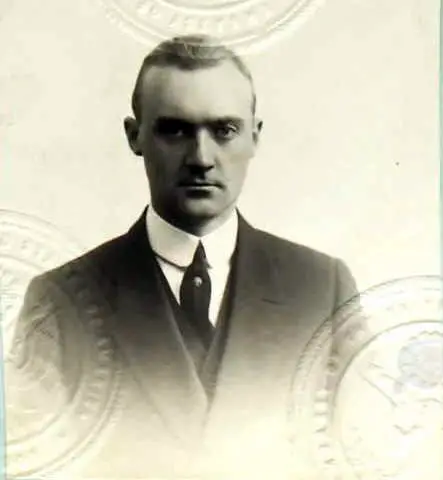
Clinton Bernard
Howard Fisher found Dorothy the following morning, and was so overjoyed that he fell on her neck with relief. Her injuries, although painful, were relatively minor: I’ve bandaged up my leg, which was rather badly gashed and has now gone to sleep. I seem to have bruised and wrenched every part of my body. Later, in London, a doctor would have to remove four large cinders ~ from the funnels~ from her ear. Dorothy’s clothing was returned to her cleaned and pressed, and when she visited with Lady Mackworth the woman commented that her outfit “looked as smart and well tailored as if it had just come out of the shop.” The foursome had dinner together, as they had every night aboard the Lusitania, and exchanged stories of their experiences during the disaster.
The following day, Dr. Fisher and Dorothy Connor departed for England. Miss Connor met Clinton Bernard aboard the train, and made plans to see him again. They were met, in London, by Dorothy’s sister, Julia Reckitt, who saw to their every comfort: She looks after me like a baby. Reflecting on items she lost, she most missed her owl ring: My dear little ring is gone- it must have slipped off when my hands got smaller in the water. But, she realized that they were just things, and that she and Howard Fisher were; the most fortunate people on the boat- we didn’t lose anything but things, and they don’t matter.
Miss Connor and Dr. Fisher kept in touch with a number of other survivors while in London. Clinton Bernard visited several times; they visited with Mrs. Lasseter after a chance meeting in Bradley’s store, with Dorothy later commenting that the disaster had aged the woman by ten years. Dorothy Connor and survivor Theodate Pope were part of a theater party that attended a performance of Rosy Rapture. And, she accepted an invitation to visit with Lady Mackworth and her father in Llanwern.
Dorothy returned to the United States in October 1915, aboard the Rochambeau. While she was home, she itemized a list of personal effects lost aboard the ship, among them:
1 Cross stole, fox $40
1 Lace evening gown $45
1 Silk gown $25
1 Velvet evening coat $50
1 Sapphire and pearl pin $25
1 Carved gold ring,
2 diamonds $50
for a total of $2,160.00.
She would file a claim against Germany for lost effects and pain and suffering, requesting $25,000 for the latter. One Lusitania-related health problem she testified to was a dilated heart. Her claim was settled, in 1924, for $15, 801.71.
Dorothy, the young woman who jokingly wrote of having “no occupation” in early 1915, and who survived a nightmarish experience shortly after, neither slipped into depression nor aimless frivolity in the months following her return to the U.S. 1916 saw her back in Europe, near the battle front, helping her sister, Julia, run the canteen she had established at Braine, not far from the Ainse River. She embraced the hard work and remarked, “The work is most interesting and I already feel very much at home.” Her duties ranged from rolling cigarettes to serving coffee: Doing the cooking and looking the part of an immaculate and dignified directrice is often difficult. She was amused by the conduct of the soldiers, who could be rowdy and who would sometimes not omit indelicate lines from the songs they would sing. She said that it was just as well that she, “did not know all the fine points of the French language. Same old story of keeping one’s eyes on the skyline.”
She wrote that when she looked out of her window, she saw: Paris buses painted gray, camions, camionettes, kitchens on wheels; gun officers on horseback and in carts and automobiles, horses going to water in the sewer which skirts our garden….I see two huge guns, one named “Marie” and the other something else, followed by ammunition wagons. Exploring the countryside, she found herself behind three guards escorting German prisoners: “Are you a prisoner, too, madamoiselle?” the French soldiers asked jokingly. She visited Brenelle, “a sweet little town half shot to pieces in the attack last month.”
Dorothy described moments of great excitement, in her letters home. The police came to search the canteen looking for a deserter. A German plane crashed in the woods after falling from a height of 3000 feet: “The German machine fell about ten-thirty in the morning. About one- thirty we found it in the woods- or what was left of it…one man escaped with a broken arm, while the other was killed.” The soldiers encouraged Dorothy to “come right up” and view the body, but she declined.
Shrapnel once struck the doorstep of the canteen and four men were killed right across the street. The pressure at the canteen proved to be too much for many staff members, and the turnover was high. Dorothy dutifully wrote home to her mother, and joked that she, “would be glad to hear what you do when Dorothy is away and you do as you please.”
Dorothy Connor was awarded a medal, her family believes a Croix de Guerre, for her bravery, at the war’s end. Miss Connor married Lieutenant Greene Williams Dugger, Yale graduate, in 1923. They met when Dorothy and her mother were guests aboard a battleship, while traveling in Panama. The Duggers had two children; a son, John, and a daughter, Mary Anne. Being a Navy family, they moved frequently, and Dorothy wrote to her Wellesley friends, “Travel is such an every day occurrence to me.” John would graduate from the Naval Academy, and Mary Anne from Wellesley.
Greene Dugger died in August 1941. Howard Fisher, Dorothy’s beloved brother-in-law, died in July 1946. Dorothy enrolled in George Washington University, taking courses in education. She was a member of the Colonial Dames of America, the Washington Wellesley Club, and the League of Women Voters. She once said, “I still find the world full of interest and excitement.” When she passed away, on August 9, 1967, her friend, Nell Cohen, would say in tribute, “It is good to know that right up to the end of her life she maintained her beauty, her charm and her dignity.”
James Reckitt, Dorothy Connor’s brother in law, published a book about his wartime experiences: V.R. 76; A French Military Hospital in 1921. Dr. Howard Fisher contributed this account:
A RECOLLECTION
The outbreak of the Great War found me in distant Oregon. Though I knew but little of the warring nations, I was, like most Americans, intensely affected and mentally placed my sympathies where they have ever since been. I was pro- British from the time the first cablegram found a place in the daily papers.
I was pro-British for several reasons. First, I had lived among English people in British India for six years and had learned to appreciate their real worth; I had an English brother-in-law; I had lived nine months as a student in Berlin and despised the Prussians and, finally, the rape of Belgium was a crime against humanity that could not be forgiven. Then, as the months went by, though the war touched neither me nor mine, the brutality of the Germans, the call for medical men and more medical men, quickened a slumbering impulse to thrust myself into the conflict.
When, in 1915, Mr. and Mrs. Reckitt commissioned Dr. Lewis Conner to select a medical staff and equipment for a field hospital to operate in Belgium, I wrote Dr. Conner. When my letter reached him, the staff was full and for the first time I realized how great was my desire to serve, how keen my disappointment.
Again the days went by as usual. I had settled down to a normal life. Then came a cablegram to me from Mr. Reckitt, “Come at once.” I was to take a part in Germany’s defeat.
There were many notable passengers on that last voyage of the Lusitania, among them Lord Rhondda (at that time Mr. Thomas) and his daughter, Lady Mackworth. Madame du Page, the wife of Belgium’s Surgeon-General, was also on board. So long as I live I shall never forget this lady’s sad, anxious face. She had just finished a tour of the United States and was returning to her ravaged country with a money contribution for the Belgian hospitals. Had she some prophetic vision of the coming disaster? Her son she had given to the war. Her husband was daily in the fighting-line. She was lost with the sinking of the ship, but her frail body reached friendly hands, I am told, and she found a last resting-place in the soil of her beloved country, out on a lonely and desolate stretch of sand dunes that Belgium still held as her own.
Lady Mackworth I saw in the wild confusion that followed the wounding of the ship and its great list to starboard. She was alone, anxiously searching for her father in the crowd that rushed here and there. She, with another woman and myself, stood on the larboard side and, after watching the ill-fated attempts to lower the lifeboats, decided to jump
into the sea rather than await the terrific rush and impact of water that would follow as the ship plunged headlong to the depths.
Lord Rhondda was returning from a munitions mission to Canada and the United States. He was very grave, ate sparingly and neither at table nor elsewhere was inclined to casual conversation. That he was masterful and shrewd in his own affairs and in those of his country, there could be no doubt, but he met his match in a raw Irish- American in the Queenstown Hotel on the night of the disaster.
It was the one humorous incident of that tragic day.
It was past midnight. The hostelry was full of the Lusitania’s ill and wounded, who were just finding the quiet and rest so much needed. There were but three of us in the parlour, Lord Rhondda, the Chief Surgeon and myself. I had said good-night and was lying under a table rolled up in a blanket, the other two were engaged in quiet talk, when in burst this wild Irish-American. In some miraculous way he, his wife and little child had been saved from death, though they had all been swept into the sea. He was celebrating his own, and their, escape. His pockets were full of whisky, his stomach equally full. He was celebrating and, willy-nilly, the two men must celebrate with him.
He burst into song and my companions added angry remonstrance to their refusal to drink.
“Drink with me and I’ll shut up.”
A second curt refusal followed.
“Then I’ll raise hell!” said the tipsy, hysterical man, “for I still have my wife and baby.”
Then he spied me under the table and dragged me out as he would a sack. “You too,” he said, “drink! ”
“No!” I replied.
As he was about to let out a war-whoop, Lord Rhondda reached for the bottle, took his drink and the surgeon and I followed in his wake.
There was one other bit of humour incident to the sinking of the Lusitania that still makes me grin when memory brings back those tragic days. That was the crestfallen looks of the porters as they ran along the London railway platform, ready to pounce upon the luggage of the travelers.
But it was the Lusitania special and of luggage there was not a trace.
The reception of my sister-in-law and myself at our hotel was no less comic. The night watchman at the door all but refused us entrance, for we were a bedraggled pair of vagabonds, disheveled from a sleepless night and without kit; I with a black eye and garments much the worse for bad usage. The watchman stood perplexed. I looked at my sister-in-law, with her little paper bundle under her arm, and grinned at what I saw. She looked at me and my queer make-up and smiled at the picture she beheld. Then we mentioned the Lusitania and the doors flew wide and hot baths, food and soft beds made us forget we were among strangers.
D. A. Thomas
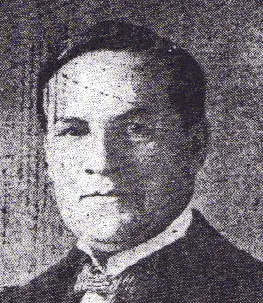
D. A. Thomas, father of Lady Mackworth and tablemate of Dorothy Connor, left this account:
Let me give you a consecutive narrative which I hope will assist the Government, the public and the Cunard Company to come to correct conclusions. I will avoid harrowing details as much as possible.
We got on board the Lusitania at nine a.m. on Saturday, May 1. She had been advertised to sail at ten: she actually left the Cunard pier at a little after twelve noon. We had seen in the press that morning an advertisement inserted, it was said on the authority of the German Embassy at Washington, notifying passengers sailing on British vessels that they did so at their own peril and that the German Government would accept no responsibility for anything that might happen to the passengers who disregard the notice after reaching the war zone. Curiously enough, this advertisement appeared in the New York Times in the column next to and in fact directly along side the advertisement of the sailing of the Lusitania that morning. There also appeared a statement by the representative of the Cunard Line pooh-poohing the threat, and giving an assurance to those sailing that the Lusitania would be well taken care of when she reached the danger zone.
Some of her passengers are stated to have received private intimation from German sources of the danger, but I received no such notice myself of any kind beyond what I saw in the press.
Well, I do not claim to be possessed of more than average courage, and I confess I felt some degree of nervousness when approaching the Irish coast, in fact, I determined to remain on deck with my daughter the whole of Friday night.
At the same time, after the assurances we had received and other information given apparently with official authority, and also after the statement that the Transylvania, a boat belonging, I believe to the Anchor Line, had been conveyed recently after reaching Ireland, I had no serious apprehension of the terrible disaster that afterwards occurred.
We had a smooth passage from New York. Only a couple of occasions did the sea become in the least bit rough. The weather was a bit foggy soon after leaving New York and again foggy shortly before reaching the Irish coast. The Lusitania hooted, and I remember remarking to a friend on board, “That gives our whereabouts away, but I suppose we are being well looked after.” That was on the Friday morning, when we were in the fog.
The fog lifted, the sea was particularly smooth, and the sun was shining very brightly without a cloud in the sky when we sighted the Irish coast about eleven o’clock. We appeared to be about fifteen miles off the Irish coast, sailing a course a good deal further away than on her outward trips when I had crossed before.
We left the luncheon table a little after two (ships time) and had barely reached the lift, there being a number of passengers about, when we heard the torpedo strike. It did not make any great noise where we were standing. I had always been led to believe that the Lusitania was unsinkable, and that it would take more than two torpedoes to finish her. We all realized immediately what had happened. I went up to ‘A’ deck to get more accurate information, and as we had previously arranged, my daughter at once went to her cabin to get her lifebelt.
All was quickly turmoil on the port side of the A deck. The boat soon began to list and I went down below to get my lifebelt. I did not succeed in reaching my cabin which was one of the parlour suites on the port side of B deck. I again went to A deck. By this time the steerage passengers had rushed up onto A deck, and they and others were crowded around the boats. There was absolute confusion everywhere, and an entire absence of anything in the way of discipline or organization.
I may say here that no attempt was made to close the port holes in the dining room deck.
I was told that the bulkheads had been closed, but in view of the very rapid submerging of the Lusitania I should require some strong evidence of this. I came quickly to the conclusion that my chance of getting into one of the boats was very remote. I, therefore remained away from the crowd, and a friend, meeting me and seeing I had no lifebelt, volunteered to go to his cabin and get me a blow-out belt.
We went together to his cabin and got it. I blew it up and put it on, and it did not give me any impression of security, as I felt it would at any moment collapse. I, therefore, determined to make another effort to get into my cabin. I succeeded, for the staircase and passages were quite clear. To my astonishment I found that the lifebelts I had left on the bed were gone! It appeared afterwards that one of the lifebelts had been taken up by my daughter to give to me, but she failed to find me, just as I failed to find her. The other lifebelt had been taken by someone.
I however, remembered that there were several in the wardrobes, and on opening these I found three. I put one on, and two of the Officers coming into the room at that moment I gave them one each. By this time the list on the ship had greatly increased, and, finding it difficult to walk up to the port side, I went to the starboard side on deck ‘B’, which by then was almost flush with the water.
Just opposite what was known as the grand staircase a boat had been lowered and was about three parts filled with people. It was about four or five feet away from the ship’s side, and was still held by the davits. There were a couple of women and a child opposite the boat. One of the women and the child jumped into the boat. The other woman became hysterical and screamed, “Let me jump, let me jump!” but was afraid to jump. I pushed her, and I made her jump, for I could not make my jump until I had seen her in the boat. Fortunately she reached the boat safely. I then put my foot on the ropes and made a jump well into the boat, which was then six or seven feet away from the ship’s side. On clearing the wreckage I helped to pick up two men and a girl, Miss Luny, who were clinging to the side.
We quickly cut ourselves away. Then another danger, which at the moment looked quite insurmountable, occurred. One of the huge funnels slowly descended towards the middle of the boat, and it did not look as if we had the smallest chance of escaping it. What happened then I can hardly say, but I shouted loudly to many nearest to me to push her away. This was done, and the funnel seemed to slide away from us as the ship went down. We were then between two funnels.
Though I believe I kept my feelings perfectly under control, I was suffering intense excitement and under such circumstances it is difficult to keep time accurately, but it could not have been more than fifteen minutes after she was first struck when the Lusitania went down bodily. I thought that it was inevitable that the suction would have brought us down, but it is a very remarkable thing to my mind that the sinking of the ship produced no effect at all on the steadiness of out boat, which then contained 50-60. It could not have held any more.
We at once moved away in a sort of way. As an old rowing man I tried to put a little organization into the business, but this was resented by two or three of the crew of the Lusitania who were with us, so I left it to them. The sea was absolutely calm; otherwise we should not have kept afloat for five minutes. The boat leaked, and we began to take in water. I helped to bail this out. It gained on us until it was up to our ankles. But after about twenty minutes bailing there was no more trouble in that direction.
We rowed in a sort of fashion for the coast, which appeared to be about fifteen miles away south west of Kinsale lighthouse, which was plainly visible in the sunshine. Soon we observed a little sailing vessel, and we made for her, going at the rate of a mile or so an hour. The smack was coming directly towards us but there was so little wind that her progress was also painfully slow.
By the way, before I forgot to say that I had set my watch to the ship’s time some little time after noon that day, and it pointed 2:25 immediately after the Lusitania sank.
We also saw the smoke of a steamer far away to the south, but after appearing to get nearer it went away again, evidently not having seen any of the boats. On clearing the wreckage I counted nineteen boats, some of them turned upside down and large pieces of wreckage with a number of people on each. In about an hour and a half, somewhere before four o’clock, a sailing boat came up to us and turned out to be the Wanderer P.L11 a Manx fishing boat of fifteen or sixteen tons. Captain William Bell, with a crew of four or five.
Captain Bell was an intelligent man. He took about 50 survivors off the boat, and about eight or ten of the crew, including two or three stewards, returned to the scene of the disaster in the boat. We, on the Wanderer, also moved in that direction, and picked up survivors on two other boats, casting the boats adrift. By this time the little smack could hold no more. We however took two more boats in tow.
A number of steamers were now coming up fast from several directions. The first one reaching the scene of the disaster about five minutes past five. We were some miles away but I could see that the steamers stood around in a circle with a diameter of several miles for some little time. Then I saw them all move in the direction of the scene of the disaster. We were then taken off by a tug called the Flying Fish and made for Queenstown, which we reached about 9.30 pm.
I had not seen or heard from my daughter since we parted at the foot of the staircase of the deck, she going for her lifebelt. I looked round for her for some time before going back for my lifebelt the second time but failed to see anything of her in the crowd and confusion. Also in my boat was my secretary Mr. Rhys-Evans. May I never suffer such agonies again. At about eleven o’clock the Steward, T. Godfrey of Seaforth, a gentleman who I am never likely to forget who had been waiting upon us on the Lusitania came up to me to say that Lady Mackworth was on a boat, the Bluebell, and she was safe but greatly exhausted. Captain Turner was also on the Bluebell.
David Alfred Thomas, Lord Rhondda, died in Wales, at age 62, on July 3, 1918. His daughter, Viscountess Margaret Mackworth, died in London on July 20, 1958, at the age of 75.
Robert Rankin
“When G.E. Co. claims Bob, the electrical world may expect a shock.”
……Cornell, 1904
That jocular prediction came from Robert Rankin’s Cornell class year book. He was born on March 23, 1882, as the first-born son born of George and Sarah Rankin of Ithaca, New York. Rankin was fascinated by electricity, and upon graduating high school he enrolled at Cornell University. When he was not studying, he was actively involved in sports, which resulted in multiple scholarships; so many, in fact, that his friends joked that he was bankrupting the Cornell treasury.
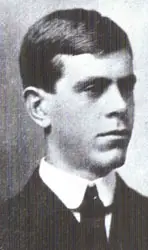
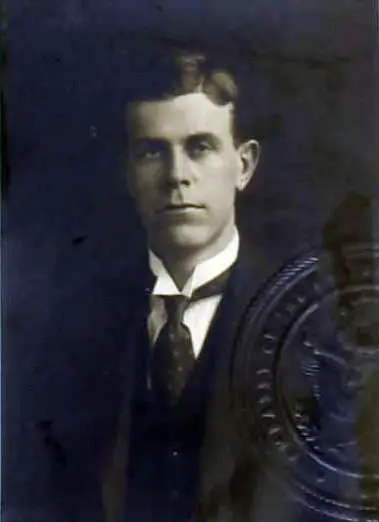
Robert Rankin
Rankin began working for Westinghouse soon after college, all the while experimenting with electromagnets and their properties. He was hired by the San Paolo Electric Co., of Brazil, which meant frequent travel.
He met socialite Enid Scott on a voyage to South America. Enid’s father was Simon Scott, a New York merchant and art collector. She and Robert married the following year.
Robert Rankin became friends with Dr. Frederick Stark Pearson, owner and manager of Pearson Engineering Corporation. Rankin’s professional dealings and friendship with Dr. Pearson led him to take the Lusitania on her last voyage. The Doctor and his wife had already booked passage, and recommended to Rankin that he should make the crossing as well.
May 1st was a dull, overcast day and Rankin did not wish to linger on deck. He was led down a maze of corridors to inside cabin E-43.
Mr. Rankin found his table companions for the voyage agreeable, and became fast friends with Clinton “Bill” Bernard, who told him that he was on his way to Greenland on a geological expedition. Rankin also spent time with the Pearsons, Robert Dearbergh, and Thomas Bloomfield.
The afternoon of the 7th was a clear, sunny day and at about noon, Rankin went to the writing room to write a long letter to his wife. Dr. Pearson passed through while he was writing, and stopped to talk with him. They discussed the sudden alteration in the ship’s course. Robert Rankin later said, “The ship turned northward from the course she had been holding making a huge semicircle and heeling well over to port.” The letter finished, he took a quick walk along the boat deck before lunch. He saw Fred and Mabel Pearson taking a stroll as well.
Robert Rankin was standing on the starboard side at some point after 2 pm, with Thomas Bloomfield and Robert Dearbergh, when one of them caught a glimpse of something unusual. “There’s a whale,” he heard. Looking out onto the dazzling blue sea, he knew at once what the black ridge was. A white, foamy streak shot out from the submarine.
“It looks like a torpedo,” Dearbergh exclaimed.
“My God, it is a torpedo,” said Bloomfield.
The three watched, as it cut through the water. Rankin described the excitement of the moment in great detail:
It came straight for the ship. It was obvious it couldn’t miss. It was aimed ahead of her and struck under the bridge. The explosion came with a terrific crash, clear through the five decks destroying the boiler room and the main steam pipe….A mass of glass, wood, etc came pouring on our heads, 200 feet aft. We ducked into the smoking room shelter and I never saw my companions again.
Robert Rankin believed from the start that the Lusitania was doomed. He crossed the smoking room to the portside, where he aided some men who were trying to push a lifeboat over the edge. But he thought that it was a useless task, for the ship was listing too far to starboard, and he abandoned this effort. He entered the companionway and made his way down, trying not to bump into the people who were rushing up the stairs. He got as far as D deck and heard the disconcerting sound of water very close to where he stood. Looking down, he saw that E deck was already flooding. He crossed the darkened passageway on D deck to a porthole, and to his horror, saw that the water was within twelve inches of the port.
Rankin came across Clinton Bernard in the stairwell. Bernard asked him, “Have you a life preserver?” to which he shook his head, “No.” They tried a few cabins, but found that the life vests were gone. The two decided that if they found one, they would share it, “fifty-fifty.”
The two friends found quite a few passengers milling about and waiting to be told what to do, as they walked along B deck. They mounted the stairs to A deck and watched the crew beginning to load boats along the starboard side. Boat # 1 drifted away with what appeared to be just one person aboard, to their dismay,. Rankin came across one of those “doughnut life preservers” attached to the rail and presented it to Bernard. They prepared to jump overboard with it when a steward approached them and claimed that there was an old lady who needed it. The gentleman unselfishly gave it away.
The last minutes were a blur to Rankin:
By this time the boat was sinking rapidly and Bernard said, ‘Goodbye old chap’ and grabbed me by the hand at the same time pulling out his money and throwing it away. The sixty foot deck was, by now, within six to ten feet of the water and I pulled off my coat and jumped, feet first, as far as I could and started to swim on my side. Looking straight up I saw the funnels coming over and thought that I would certainly be hit on the head. Then the funnels went back and the bow plunged and the ship went down.
The water felt like ice to Rankin. He noticed that he was covered with a layer of soot from the funnels. He swam to boat #11, which was packed with more than sixty people. The assistant deck steward pulled him in, despite the crowding. Boat #11 drifted with the tide and wind, for it had no rudder. Finally, the Wanderer, of Peel, came to the rescue and pulled them aboard. They were later transferred to the Flying Fish and taken to Queenstown.
The arrival at Queenstown was striking, as the wet and weary survivors walked between a line of townspeople. The crowd cheered and applauded as they made their way forward. Rankin felt a lump in his throat as the magnitude of the tragedy hit him. A “jacky-tar” gave him a drink of hot whiskey and put him to bed.
The next day, he made his way through the town looking for his friends. He found Clinton Bernard, who had swum to a collapsible and rescued many people, among them Stanley Lines and Dorothy Conner. Rankin found Dr. Pearson lying in a makeshift morgue and arranged for his embalming. Rankin and another shipboard acquaintance, Robert Timmis, motored over to Kinsale the Sunday after the disaster to help identify bodies, but found no one that they knew.
He gave a brief description of his experiences to the American Counsel, which was sent to the State Department in the form of a deposition:
At 12 pm ship began zigzag course off Irish coast. Walked deck till 1:30. Went to lunch 20 minutes. Arrived on rear starboard A Deck at about 2:00 pm, ships time of night before. At exactly 2:10 pm one of our group of four sighted submarine rising about 1/4 mile to starboard bow. Lusitania going slow all morning. Had been blowing fog horn till about 10:00 am and was still going about 15 knots. Torpedo left submarine almost instantly after sighted and traveled rapidly toward boat, leaving white trail. Struck ship not far from a line below the bridge and through boiler room. Explosion tore through deck, destroying part of forward lifeboat. A boiler exploded immediately. There was no second torpedo. Boat listed immediately and began to fill through open ports as well as the hole caused by explosion. Ship sank at 2:33 by watch of passenger who jumped in sea. Torpedo fired without warning and while most of passengers were below at breakfast.
Mr. Rankin arrived in London on Monday afternoon, intent on keeping his business appointments, although he had lost all his papers. He returned to the United States aboard the St. Louis, along with survivors Oscar Grab and Charles Hardwick; they arrived in New York on June 7, 1915.
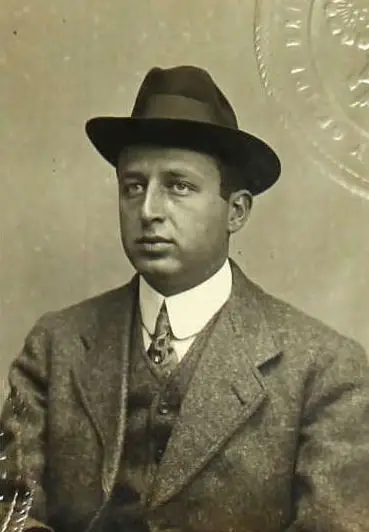
Oscar Grab
The Lusitania disaster did not deter Rankin from traveling. He left San Paolo Electric, and he and his wife moved to Peking, China where he was appointed vice president of both Anderson Meyer and Co and the Willard Straight Co. He also served as the director of the Chinese American Bank of Commerce. Relations between Robert and Enid deteriorated, and they separated and then divorced. His ex-wife moved back to New York and wrote a book titled Dominions of the Air. It examined the causes of war and offered suggestions on preventing future wars. She passed away a few years later at age forty-three. Apparently Rankin and Enid adopted a Chinese child named Peter, but he is not mentioned in either of their obituaries.
Robert Rankin retired in 1920 and began traveling, to relax and to forget about his failed marriage. He met a woman named Hilda Master Rigby and they were wed on February 24, 1923. They settled in Angmering on Sea, Sussex, England.
Robert Rankin filed a claim for compensation for lost effects and was awarded $1,362.00.on February 21, 1924.
The Rankins moved to St. Catherine’s, Ontario, where they remained for many years. Robert became a father, at age fifty-two, to a girl who they named Virginia. He went to Washington, D.C. during World War II, to work as an engineer for US Government, and he became a technical adviser to Evans International Corp after the war. Robert eventually returned to retirement back in St. Catherine’s, Ontario. He began vacationing in Provincetown, Massachusetts in old age, where he could, no doubt, look back and smile at life filled with promise well realized. Mr. Rankin passed away in Provincetown on August 10, 1959 at age 76.
James Tille Thompson
James Tilley Houghton was born in Saratoga Springs, New York, on July 23 1885. His father was James Warren Houghton, a Justice of the Supreme Court of the State of New York. He was prepared for college by private tutors, and went to Harvard University in the fall of 1904, where he was a member of the Pi Eta society and took lead roles in several of the society’s shows. He received his college degree in 1908 and three years later his medical degree.
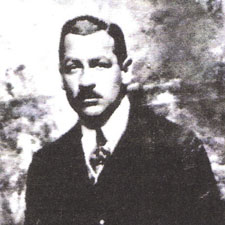
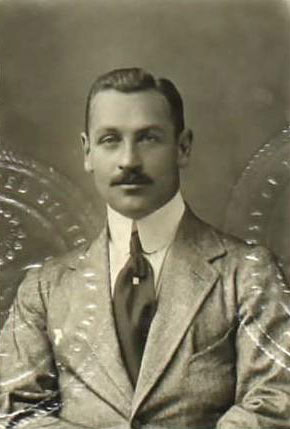
Houghton went to work at City Hospital in Boston, Massachusetts. It was there, in February 1913, that his father was admitted for surgery after falling ill with appendicitis. The operation was not a success and Justice Houghton died on February 14, 1913.
Dr. James Houghton was working for the Belgian Red Cross by 1915, under the supervision of Dr. Antoine Depage at his hospital at La Panne. He boarded the Lusitania on May 1st, joining Marie Depage, wife of Dr. Depage. Madame Depage, who was the head of the Belgian Relief Society, had been touring the United States, appealing for funds to help the Belgian relief effort.
Two telegrams were waiting for Dr. Houghton in his cabin, E64, which read: Best wishes, fine trip and speedy return. Cable address, will miss you terribly. God protect you – Hugh Caroline. Goodbye and good luck – Teresa.
The voyage passed uneventfully. Houghton renewed his acquaintance with Lindon Bates Jr. and Major Frederic Warren Pearl, both of whom worked for the Red Cross. He also met fellow a Harvard graduate, Richard Freeman, class of ‘09. Dinner each night was spent in the company of Madame Depage, and Theodate Pope and Edwin Friend, both of Connecticut.
Houghton was interviewed upon reaching Queenstown, and gave the following account of the disaster:
I may say that I had a dreadful foreboding that we were torpedoed and was not surprised when I got on deck to be informed by an Officer that we had been attacked by a German submarine. By the time I had reached the deck the vessel had decided list to starboard. I remained standing on the deck for a moment or two and was joined by Madame Depage.
The boats were by this time being lowered. An Officer told us that there was no danger. The vessel would be heading for Queenstown and would be beached there, if necessary.
The liner was again struck, this time forward of the main bridge. The first torpedo had struck midships. The second attack was evidently of a more deadly character than the first, as quite suddenly the big vessel began to settle by the head. Orders quickly came from the bridge to lower all the boats. This work was at once commenced.
Women and children were being rushed to the boats and were being lowered, some of them successfully, but others not. Many people were thrown into the sea. I saw the time to leave the ship, now well down by the head. I said to Madame Depage that we had better jump overboard and trust to be picked up by one of the rafts or lifeboats. This we both did. As I struck the water my head came into contact with a piece of wreckage which stunned me and I commenced to sink.
Happily I came to the surface again and I struck out for a damaged raft that was not far away. My first thought was to try and see Madame Depage but no trace of her was to be seen and I can only conclude that she was drowned.
Quite a number of people were on the raft and it was sinking under us. One poor fellow lost his reason altogether and jumped into the sea and was drowned. We were about 100 yards from the Lusitania when she foundered. It was an appalling sight to witness as her decks were still crowded with passengers frantically rushing about in a frenzied state. The spectacle in the water was even worse when scores of people were struggling to keep afloat and some shouting for help. But we could not give any assistance.
We were eventually picked up by a trawler and transferred to the tug Stormcock. We were then brought ashore at Queenstown. It was an awful experience and I thank providence for my escape.
Marie Depage
Marie Depage was lost, but her body was found and identified. Her husband traveled over from Belgium, and her body was embalmed and taken to the La Panne hospital, where she was buried. An interesting aside about Madame Depage, is that on May 8th 1915, a completely believable and lucid survivor account given by this definite victim ran in several newspapers, which highlights one of the pitfalls of newspaper-based research.
The Boston offices of the Cunard Line sent a telegram on May 11th; Ask Dr Houghton, survivor when he last saw Richard Freeman and if Freeman left the steamer uninjured. The same office received a telegram on the 13th stating: Dr Houghton states he and Freeman jumped into the sea together and were separated, Freeman was uninjured then, but regret there is no trace of him. Freeman did not survive the disaster, and his body was not recovered. The “poor fellow” who lost his reason and jumped into the sea was recognized as another first class passenger, George Ley Vernon.
Houghton traveled on to London, where he went to the American Embassy, and then returned to the United States aboard the Cameronia, arriving in New York on June 7th. He never returned to La Panne to help Dr. Depage.
Houghton was eventually awarded $12, 372, 00 in compensation as a result of the disaster.
He went to the Mexican border in 1916, with the Old 69th Regiment of New York, under Colonel William Haskell, and it was also in that year he married Mabel Parsons. The following year his son James Tilley Houghton, Jr., was born.
He immediately returned to the 69th Regiment when the United States entered the war in 1917, and traveled overseas with them in the Rainbow Division. He returned to the United States when the war ended.
Houghton went to the South Sea Islands in 1921, on a treasure hunt. In 1923 Colonel Haskell asked him to join his staff on the Red Cross Relief work in Greece. He worked in a plague-infested area of Macedonia. He was knighted by King George of Greece and received the Order of St George. Houghton relocated to Honduras, in 1924, to take charge of a new hospital at La Ceiba. He knew that a revolution was under way, but went just the same. He found the hospital woefully inadequate, with only an emergency kit and a few medicines with which to treat and operate upon 450 wounded. He performed several successful operations using only a razor blade.
Houghton chose the wrong side of the revolution. He managed to escape capture by retreating into the forests, and eventually escaped by boat to the safety of Guatemala. Houghton resumed private practice upon his return from Central America, and held an important position within the Travelers Insurance Company. He divorced his first wife, and in 1929 he married Caroline H. Pritchitt. Together they had a son.
Dr. Houghton became seriously ill in early 1931. His family and friends told him that he was suffering from Undulent fever, but in fact he was suffering from streptococcus in the blood stream. He died in New York City on March 25th, 1931, at the age of 45.
Fullerton Riemer Boyd
There was a Lusitania crew member with an interesting link to Germany aboard the fatal voyage.
Fullerton Riemer Boyd, 37, listed on the crew manifest as a barkeeper, had led his family in Joliet, Illinois, to believe that he was the Lusitania’s assistant purser. His family had not seen him in nine years, although his sister- in -law had visited with him aboard the Laconiain 1913. They received a letter from Boyd, mailed on May 1st, in which he wrote that he was not in the least apprehensive about the coming voyage, and that the passengers were being warned.
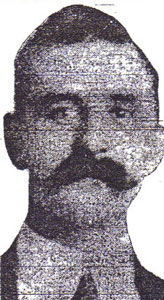
Fullerton’s name did not appear in the initial list of those saved, which was reprinted in midwestern newspapers. His brother-in-law Edward Kobbe, an official of the New York office of the Hamburg-American Line, was able to determine that Boyd had survived, and sent his family a telegram reading “Thank God Fullerton Is Among The Rescued.” Kobbe told his in-laws that he had received the news through his London offices.
Boyd died in Southampton, England, on October 17, 1929, at age 51.
Josephine Mary Brandell
Josephine Mary Brandell was a rising stage star in 1915.
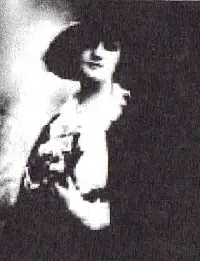
She was born November 26, 1891 in Bucharest, Romania. Her family came to America in 1900 and settled in New York. She dreamed of stardom, like many young people, and made an attempt to break into show business on the New York stage while in her early teens. However, she abandoned her efforts to establish an acting career when she married Dr. Bernard Black Brandeis, on February 15, 1907, at age fifteen. The marriage was short lived and the couple divorced in September 1910.
Josephine became involved in the theatre again, following her divorce. She was soon cast in a production of a comic opera by Johann Strauss, Night Birds, which toured Europe and America. A newspaper compared Brandell to the star, Fritzi Scheff, saying that she was ‘commensurate with Miss Scheff’s prestige.’ She was starring in the London Opera House’s production of Come Over Here by 1914,.
Miss Brandell crossed the Atlantic aboard the Lusitania several times. She was aboard the Lusitania’s February 1915 crossing, and chose the Lusitania, again, for her return to London in May. Josephine’s friend, Mabel Crichton, was booked on the same sailing. Mrs. Crichton was to provide Josephine Brandell with much emotional support. The actress was among the handful of passengers who remained worried throughout the crossing.
Josephine did not feel confident that the ship could outrace a submarine and, as she put it, was “in a state,” for a good part of the journey. She and Mabel became acquainted with their tablemates; Max Schwarcz and Francis Bertram Jenkins. She could not get over her feeling of dread, despite the pleasant company. Jenkins did not alleviate her fears by pointing out the lack of lifebelts.
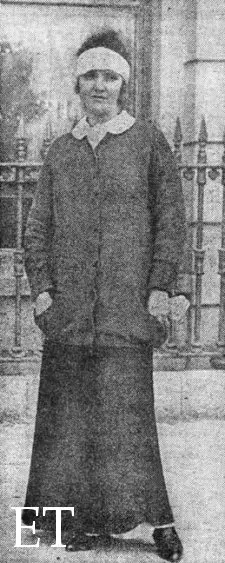 |
| Josephine Brandell Daily Sketch Jim Kalafus Collection. |
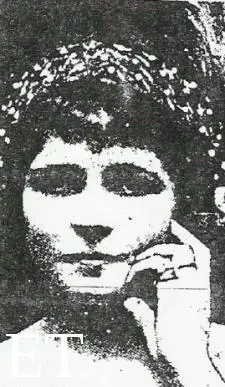 |
| Mabel Crichton Courtesy of Paul Latimer. |
I had just finished making a collection for the musicians and sat down to finish my lunch where Mrs. N. Crichton , Mr. Jenkins and Mrs. Schwartzs, an American, were sitting, when I heard the explosion. We all jumped up, poor Mrs. Crichton exclaiming “They have done it!” In fact, I was nervous during the whole trip; so much so that I kept worrying my friends about fearing the submarines.
Thursday night I was in a state that I could not sleep in my own cabin, so I asked Mrs. Crichton if I could sleep in her cabin. Poor soul, she was only too happy to be of any assistance to me and did all she could during that whole night to quiet my nerves.
The next morning, I heard the hooting of the horn, as it was foggy. Everything went well until I sat down to lunch when the explosion occurred. The people rushed for the stairs. I heard someone shouting to be calm. I looked up and saw that it was one of the captains. I cannot say whether it was the first or second.
When we finally reached the top deck, I saw very few of the first class passengers. I was simply horrified with fright. Mr. Schwartz’s trying to calm me, when Mr. E. Gorer (the art dealer of Bond Street) rushed over to us and put a life belt on me, which was my means of being saved, and told me to be brave. He returning for other life belts and Mr. Schwartz, after putting me into the boat where Mrs. Crichton was already sitting, went to help other women. That’s the last I saw of those two brave heroes.
Just then, our boat was lowered but immediately it hit the water it upset throwing all its occupants out. About six were saved from that boat which contained sixty or seventy passengers.
The sights I saw when that boat upset is too awful. Words cannot describe it. A rope was thrown to us, which a few caught hold of. I then remember a few of us getting hold of an oar, but some of them soon dropped off. The cries for mercy, the people drowning and coming up again within three minutes time barely touching me was too terrible.
Somehow, I caught hold of a deck chair which was floating near me and held on until I became numb when I was picked up by Mr. Harkness, the assistant purser, who afterwards told me he thought I was gone when he first looked at me.
Josephine Brandell came ashore in hysterical condition, and one survivor in the same hotel room later remembered asking her to calm down. She found Francis Bertram Jenkins the following day, but there was no sign of Mabel Crichton, Max Schwarcz, or Edgar Gorer. Josephine took it upon herself to inform William Crichton of his wife’s last moments. He could not be consoled, and passed away a year later.
Josephine did not fulfill the promise of her early stage career. She chose not to pursue starring roles after the disaster, and acted only occasionally. She helped with the war effort, and following the Armistice, she accepted the proposal of John Ormiston Lawson-Johnston. They were wed on May 19, 1920. The marriage was not a happy one and ended in divorce. She was married yet again to George John Seymour Repton on June 1, 1929. George Repton attained the rank of Captain during his service in the Irish Guards. Miss Brandell was well known during World War II, as the founder and chairwoman of The American Friends of Britain. Captain Repton died on May 10, 1943.
Josephine married once again, on December 7th, 1945, to Beresford Cecil Bingham Annesley, 8th Earl Annesley and 9th Viscount Glerawly. He was a Pilot Officer in the service of the Royal Air Force Volunteer Reserve during World War II. He had previously been a Lieutenant in the service of the 6th Battalion Royal Fusiliers. Their marriage lasted until his death on June 29, 1957.
Countess Annesley returned to the United States and spent her final years living in New York City, dying there in August 1977.
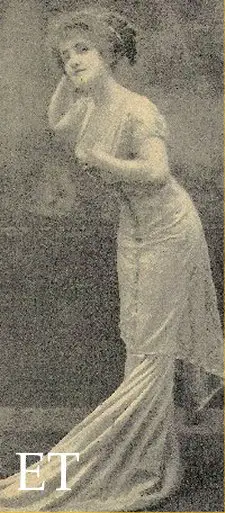 |
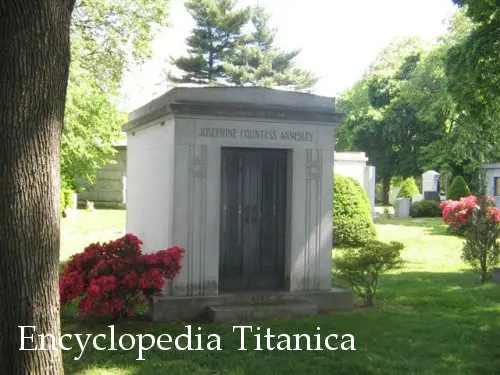 |
|
Josephine Brandell age 15
(Shelley Dziedzic) |
Josephine Brandell’s Grave at Woodlawn Cemetery, Bronx, NY
(Michael Poirier) |
Maude Thompson
Maude Thompson, one half of an extremely appealing young couple parted by the disaster, eventually became the second of three Countesses among the Lusitania’s survivors.
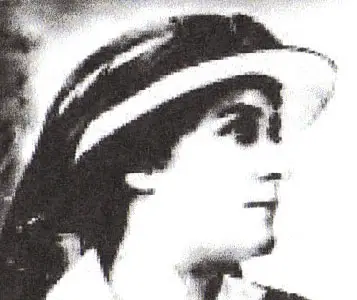
It was clear from the day Maud Robinson was born, October 25, 1882, that she would be afforded many excellent opportunities in life. Her parents were affluent residents of Long Branch, New Jersey. She was descended from Martin Kalbfleish, a two term Mayor of Brooklyn. Maud believed in being assertive, even penning an article on the problems of sensitive girls and how they may overcome their handicaps: “Pity the sensitive girl… give me the jolly girl who is perfectly natural and who takes on the world as she finds it and the people as she finds them, too, without worrying over the impression she is making.”
It is not clear how and when Maud Robinson met Elbridge “Blish” Thompson, but they married in 1904, the same year he graduated from Yale University. The ceremony took place on March 31st.
Elbridge Thompson was born on October 2, 1882 in Seymour, Indiana. His family owned the prosperous Blish Milling. He attended Andover and Lake Forest, and studied Metallurgy at Yale.
The couple moved to Colorado shortly after their marriage; Blish was interested in developing mining property there. They moved back to Indiana a year later, and he was elected secretary of Blish Milling. The Thompsons were active in politics, and Elbridge was a leader in the Republican County Organization. He and ‘Maudie,’ as he affectionately called her, took part in community affairs such as ‘The Festival.’ He drove his roadster, uniquely decorated as a battleship, while his wife good-naturedly rode by his side.
The Thompsons planned a three month trip, combining business and pleasure, on which they would tour England, Scotland, and Ireland. They booked passage on the Lusitaniaand were assigned cabin, A-21. A few days later they upgraded to a suite with a private bath, B-68, for which they paid $500.
Maud and Blish enjoyed their vacation, spending time with other couples, such as Harry and Mary Keser. They befriended a pair of families with children; the Hodges and the Lucks. It turned out to be a wonderful voyage for them, comparable to a second honeymoon. They made plans to awaken early on May 7th to watch the sun come up:
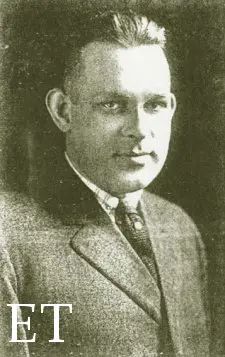 |
| “Blish” Thompson. Courtesy Charlotte Sellers. |
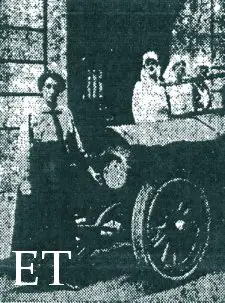 |
| Maude Thompson Mike Poirier Collection |
About 4:30 or 5:00 A.M., the day of the disaster, husband and myself had dressed and were standing on ‘A’ deck to watch the sun rise. At that time, we saw a battleship off on port side and traveling in the same direction as the Lusitania. The latter was moving very fast at this time. The battleship was close enough so that we could see the whole vessel and its lines distinctly. The fact of the presence of this battleship has not been mentioned, to the writer’s knowledge, by anyone.
We were eating lunch at the time the torpedo struck the ship. Just a few minutes previously I had noted the ship’s clock in order to set my watch, and I remember that it was just 2:05 P.M.
The impact of the torpedo against the ship could be plainly felt; the noise of the impact, however, was not like that of an explosion but made a “jamming noise” like a heavy boat will make in rubbing against a piling, for instance. There was no noise at any time like an explosion, and no further sound following the striking of the torpedo.
My husband and I immediately jumped up from the table, the former exclaiming “we are torpedoed!”
We immediately ran up the stairs leading from the dining saloon. On the stairs was the only time and place that we saw any of the ship’s stewards or officers (except one). They told us to take out time and keep calm.
We went immediately to B deck and helped Mr. and Mrs. Hodges and their two small boys. The entire Hodges family was lost. After arriving at b deck, Mr. Thompson went to his cabin, B-68, to get life belts. He returned with two life belts, also coats and sweaters, which we put on. After a moment he went back again to his cabin for his passports and money.
After rejoining me, we went up on the A deck. On A deck we saw the Keser family of Philadelphia, and also Mrs. Luck and her small sons. Mrs. Luck had no life belt, and Mr. Thompson removed his and together we put it on Mrs. Luck. These were the only people whom we saw at this time and place.
While on the A deck, the single member of the ship’s crew above referred to came past us. He was telling the crowd, “The ship is perfectly safe. You are alright.” at this time and place, also, the writer heard the order given from the bridge “Lower no more boats.”
After we had been on this deck about ten minutes the boat sank, plunging bow foremost with extreme suddenness. The plunge was entirely without preliminary warning. Previous, the ship had listed to starboard to such an extent that it had been difficult to walk up stairs. Impossible to say how far the ship had settled prior to sinking.
When the ship plunged, it stood up almost perpendicular and thereby swept everyone overboard in a mass, and we were swept half the length of the ship. The writer does not remember striking the water. The first sensation came to her under the water. Did not see her husband again after the ship plunged.
The writer was in the water only a short time and was picked up and taken on a small raft, on which there were fifty others, of which only a small number, about fifteen, were passengers. Was pulled about the raft by Guy R. Cockburn, 10 Warrington Crescent, Mada Hill, London W. England.
We were three hours on the raft and were being carried out to sea when the party was picked up by the tramp steamer Kretnia [Katrina- authors] The crew on this boat did everything possible to assist those whom they had rescued. We were taken to Queenstown.
Maud was taken to the Admiralty House with Amy Pearl and Rita Jolivet. Rita claimed to have taken the two women down to the Queens Hotel to care for them and Lady Allan. There was no sign of Elbridge, so she sent home a telegram that read, ‘Maudie safe.’ Unfortunately, it was transcribed incorrectly, and read ‘Maud safe I also.’ The following day, she sent another saying,‘ I am safe waiting news from Blish.’ The family, confused by the contradictory messages, questioned the telegraph operator from Mays, Indiana and learned that a mistake had been made.
Maud continued searching, but could not find any trace of her husband. She sent another telegram asking for advice as to what to do. She finally decided to proceed to London, to the house of her friend Mr. Raikes, to await any further developments and to convalesce.
She was ready to come home by June. There had been no word of her husband for almost a month so there was no sense in remaining overseas any longer. She booked passage on the St. Paul, which was to arrive in New York on June 13, 1915. The St. Paul carried home many Lusitania survivors; James Leary, Charles Sturdy, Herbert Colebrook, Doris and Joseph Charles, Percy Rogers, Ogden Hammond, and Virginia Loney, listed as Virginia Sedgwick. Two Titanic survivors, Robert and Eloise Daniel were also aboard. Maud’s sister and some Thompson relatives met the ship.
Elbridge Thompson’s memorial service was held on June 18th, at the First Presbyterian Church in Seymour. Reverend Lewis Brown, who delivered a short address on “Immortality,” conducted it. People from all walks of life attended the service; from employees of Blish Milling to Blish’s roommates from Yale. Soon after, Maud endowed Yale with a scholarship of $600 annually to the Sheffield Scientific School, which was to be awarded to graduates of Shields High School, Seymour, Indiana.
Blish’s two cars sat in the garage of the Thompson home. Maud decided that she would have the National roadster rebuilt as a scout car. She took the other National, a touring car, to France herself and turned it over to the Red Cross. She decided to stay and work with the humanitarian organization throughout the war. She met Count Jean de Gennes, a French fighter pilot. He was twelve years her junior, but despite their age difference, they fell in love. The two married on November 17, 1917 in Paris. She gave birth to a son, Jean-Marie, on December 20, 1919. When the child was a year old, Maud and the Count took him to visit with Blish Thompson’s relatives. Maud still had an active interest in the Blish Company, and she occasionally returned for board meetings, but she considered France her home.
Maud’s marriage was a happy one but, once again, tragedy struck. Her husband, a pilot for Compagnie Aeropostale, was killed in a plane crash in 1929. She was left with a nine-year-old son to raise. She may have considered moving back to the United States to be near her family, but she ultimately chose to stay in France.
Maud remained in Paris through World War 2. Her son, Jean, joined the Free French, crossing the Pyrenées in November 1943, and was soon fighting for RAF, aboard a Halifax on bombing raids over Germany
The Countess de Gennes returned to the United States aboard the French ship, Desirade, in early 1946, and settled in New York. Her son was working for Air France by that time. She spent the remainder of her days in Sunnyside, Queens, passing away on May 17, 1951. Her final wish was to be buried in France, and so she was buried in Paris, beside her husband, in the Montparnasse Cemetary.
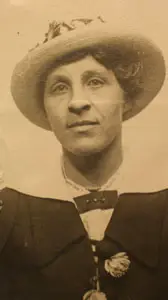
Charlotte Luck, to whom Blish Thompson surrendered his lifebelt, did not survive, nor did her sons Elbridge, 12, and Kenneth, 8. Charlotte and her children had stayed in San Francisco with her mother, Mrs. Field, during Arthur Courtland Luck’s extended business trips abroad, although their home was in Worcester, Massachusetts. None of the bodies were recovered, and Mr. Luck was eventually awarded $20,000.00 for the loss of his family. Frances Lapham Field, Charlotte’s mother, was awarded $5000.00 for the loss of her daughter’s financial support.
Rita Jolivet
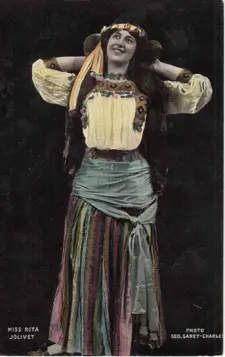 Rita Jolivet, stage and screen actress, remains one of the most frequently referenced of the Lusitania passengers. Unlike many others survivors, she apparently assimilated the memory the disaster quite well. She spoke frequently of the sinking, but she did not seem haunted by it, and the nightmares, panic attacks, guilt and anger which plagued the later years of so many of the Lusitania’s survivors do not seem to have been a major factor in her life. Her fame as a survivor has outlasted the acclaim of her dramatic career.
Rita Jolivet, stage and screen actress, remains one of the most frequently referenced of the Lusitania passengers. Unlike many others survivors, she apparently assimilated the memory the disaster quite well. She spoke frequently of the sinking, but she did not seem haunted by it, and the nightmares, panic attacks, guilt and anger which plagued the later years of so many of the Lusitania’s survivors do not seem to have been a major factor in her life. Her fame as a survivor has outlasted the acclaim of her dramatic career.
Rita Jolivet had her first success on the London stage, but was best known in 1915 for her long run Broadway in the hit, Kismet ,and her critical success in A Thousand Years Ago. Her first major motion picture, The Unafraid, by Cecil B. de Mille, had just opened when Rita boarded the Lusitania that May. The film has survived, and shows that Miss Jolivet’s vibrancy onstage made the jump to the big screen. She seems perfectly at home before the camera, and her acting style is subtler than is often found in films of that era.
Miss Jolivet, according to her family and contemporary reviews, was a born raconteur. Vivacious, expressive, and quite flamboyant, the Lusitania disaster lectures she gave in conjunction with her Lusitania movie, Lest We Forget, were given high marks as both entertainment and education. Rita’s 1918 testimony at the United States Limitation of Liability hearing remains the best, and least fanciful account of her experiences on May 7, 1915. It is presented here in its original Q&A form:
Q. When did you make up your mind to sail; when did you go on the ship?
A. At 8 o'clock in the morning I made up my mind to sail, and I arrived at the dock at five minutes to ten. She was due to sail at 10 o'clock. The reason for my doing so was because the Lusitania was supposed to go quickly, and I wanted to see my brother before he left for the front.
Q. Had you expected, or thought of going on the St. Paul that same day?
A. Miss Ellen Terry had suggested my going, and I said no, that I was in a hurry and was on schedule time and was afraid of not seeing my brother.
Q. When did the steamer finally sail, as far as you recollect?
A. She finally sailed about 1 o'clock.
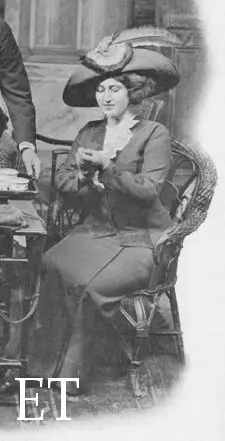 |
| Rita circa 1910. |
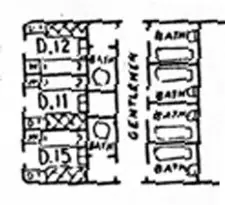 |
| Jolivet Cabin (D-15) (Courtesy of Paul Latimer) |
Q. Your stateroom was on what deck?
A. On Deck D; it was a very bad room, because it was the last moment, and I had to take an inside cabin.
Q. Were you alone?
A. Yes, but to my great surprise I found my brother in law was going back too. I met him on the boat. He had also decided to hurry back to his wife, and she was in England.
Q. There was no special circumstance on the voyage up to the day of the torpedoing?
A. Not at all, except for rumors.
Q. On that day, on the 7th of May, Friday, did you notice anything about the speed of the vessel, as compared with her former speed?
A. Yes, I noticed that she had slowed down.
Q. On Friday do you recollect seeing the shore at all, and if so, about what time?
A. I saw the shore when I was in the water.
Q. Did you see it while you were on the steamer at all?
A. No sir, because I had not slept well the night before and I had just got up for luncheon, and as I had an inside cabin I could not see the shore from my cabin
Q. Where were you at the time the torpedo struck the ship?
A. I was down in my cabin on deck D.
Q. Did you feel one shock or two shocks?
A. I felt a great shock, and I was thrown about a great deal, and she listed tremendously.
Q How soon did she begin to list after the shock?
A. It seemed almost immediately; I didn't think we were torpedoed, I thought we had struck a loose mine.
Q. What did you do after you felt the shock?
A. I looked out and saw a woman putting on a lifebelt, so with great difficulty I climbed up and got hold of my lifebelt which I carried in my hand.
Q. Where did you get it?
A. From the top of the wardrobe; I climbed up on my bunk and got hold of the lifebelt. I believe there was a second one there, but I couldn't reach it very well. Then I climbed up on deck; I wanted to meet my brother in law who was waiting for me on deck A.
Q. You have spoken of the list that came immediately. Was that before or after you left your cabin?
A. Before I left my cabin; with great difficulty I walked through the corridor and walked up the four flights of stairs to deck A.
Q. You found whom there?
A. I found my brother-in-law and Mr. Charles Frohman, and a Mr. Scott. I believe there was another gentleman behind, that they said was Mr. Vanderbilt, but I don't know; I am not sure of that.
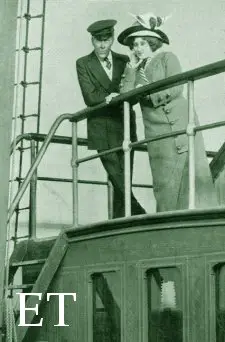
Rita Jolivet
Jim Kalafus Collection
Q. Did you put on your lifebelt then?
A. No; my brother-in-law said “Did you bring any others?” and I said “No,” because I couldn't reach the other. In fact, I didn't know that there were other lifebelts in my room; there were, but I didn't know at the time, in the hurry I just grabbed the first one. Then Mr. Scott went downstairs to deck B and he got up four lifebelts, and gave one to my brother-in-law, and one to Mr. Frohman, and one he kept for himself. And while he was helping Mr. Frohman on with his, and my brother-in-law was helping me with mine, someone stole his, Scott's, lifebelt, and Mr. Scott went down a second time and brought up other lifebelts from deck B, and he gave his away to an old woman. We all offered him ours, and he said no, he could swim better than any of us, and if we had to die we had to die; why worry?
Q. Did you see any of the lifeboats lowered while you were up on deck A?
A. Yes. We agreed to stick together and I looked out on the deck and I saw a lifeboat being lowered, but the guard slipped; it was not lowered evenly, and the women and children were thrown out.
Q. Do you remember which side of the ship that lifeboat was on?
A. I am not quite positive; I am not quite positive but I think it was on the side that was nearer the port, nearer the shore.
Q. That would be the port side?
A. Yes, that would be the port side.
Q. Did you notice anything about the list of the vessel as you stood up on deck A, whether it listed the same or whether it increased or not?
A. No, it did not remain the same. She righted herself. She seemed to right herself. It was only noticeable at the beginning.
Q. How did you finally get off the ship?
A. My brother-in-law took hold of my hand, and I took hold of Mr. Frohman, and we went out through the door on to the deck, and the water swept me away from my brother-in-law and from Mr. Frohman, swept me with such force that my buttoned boots were swept off my feet. I was struck under the water. I sank down twice. When I got up again there was an upturned boat on which I put my hand and clung to…the boat I clung to had canvas on it, and as a great many other people were clinging on to it we were sinking, and then came from under it a collapsible boat that carried away the extra people. We remained out there for three hours and a half, and were picked up by a Welsh collier.
Q. Was this lifeboat you clung to a regular lifeboat or a collapsible boat?
A. It was a regular lifeboat.
Q. When you went over the side was the water up to the deck?
A. It was the water that swept me away.
Q. Water came on the boat deck?
A. Yes.
Q. That part of the ship was down practically at the water's edge?
A. Oh, it had already sunk; it was the water coming up, you see.
Q. The lee side was under water then?
A. Yes.
Q. On what part of the deck were you?
A. I was in the middle of the deck.
Q. In the middle from side-to-side?
A. In the center near the elevator; near the lift.
Q. From side to side?
A. Yes; then we went out on to the deck and saw the ship was sinking right away, and waited ‘til the last moment, you see, and then she sank…
Rita, while in Queenstown, was in the company of Amy Pearl, who was pregnant and who had who lost two of her four children; Maud Thompson, widowed by the disaster; and the injured Lady Marguerite Allan, who lost both of the daughters accompanying her on the voyage. It is likely that Miss Jolivet was also in the presence of survivor Beatrice Witherbee, who lost her mother and son in the disaster, although she is not mentioned in any of Rita;’s accounts. Rita remained in touch with Amy Pearl for time, and Amy’s daughter recalled that the two often visited one another. She may also have kept in contact with Lady Marguerite Allan, for she married Sir Montague Allan’s cousin, James Bryce Allan, in the 1920s. A private film of the wedding was made and has survived, unlike most of Rita’s commercial output.
 |
 |
|
George Ley Vernon, Jolivet’s brother in law and another victim
|
Rita, circa 1918
|
The Lusitania survivor with whom Rita kept in most constant contact was Beatrice Witherbee. Her husband had placed Mrs. Witherbee in a nursing facility, after she sank into a deep depression. When Rita Jolivet learned of this, she had Beatrice removed from the facility, and brought to the Jolivet family mansion in Kew, England.
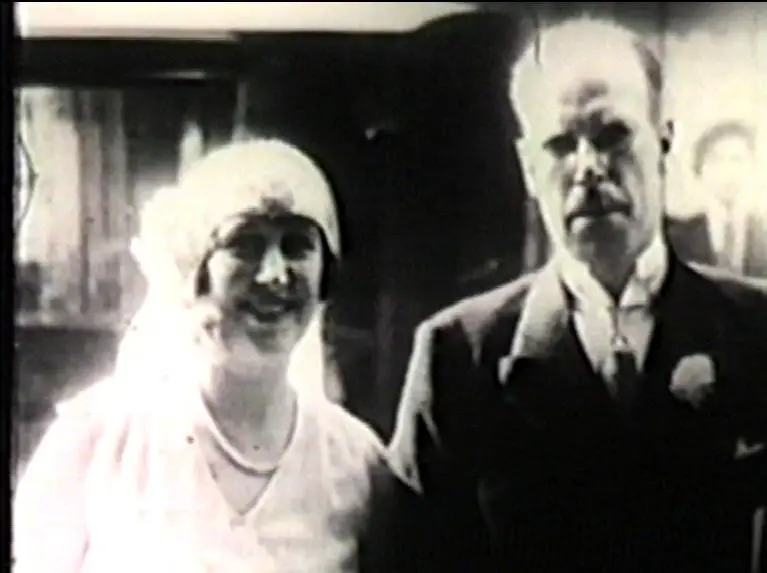
Marriage of Rita Jolivet to James Bryce Allen
(Mary Jolivet / Mike Poirier collection)
Beatrice Witherbee married Alfred Jolivet, Rita’s brother, in 1919. The Jolivet family matriarch, Pauline Vaillant, raised both of her daughters to be “great ladies” in the French tradition: artistic, well read, temperamental, and demonstrative. The Jolivet family remembers, with amusement, that Rita’s brother became the polar opposite of his sisters, and was the intelligent but reserved “perfect English gentleman” who occasionally found their flamboyance irritating.
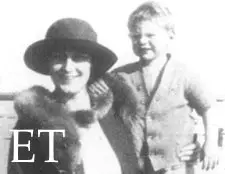
Beatrice and Alfred Witherbee Jr.
Courtesy Lawrence Jolivet
Rita had made her stage debut in London while still a teenager. She was later guarded about the details, and did not care to name the play in interviews. She described it as “a discouraging disaster.’’ But, by 1915, West End, Broadway, and film success had been achieved, and when she boarded the Lusitania, her future prospects seemed unlimited.
She married Count Giuseppe de Cippico in 1916, while at the height of her film career. The pairing of Hollywood and nobility was irresistible to movie magazines, and the couple garnered much press space. Rita made films in the United States, France, and Italy, generally to excellent reviews. Yet, as a 1935 profile in the New York Daily News stated, the career momentum that seemed to be propelling her towards superstardom before the disaster, afterwards faltered, and in the end it can be said that she remained well known, but never made the jump into stage or screen legend.
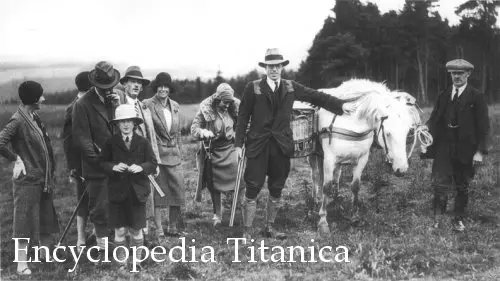
Scotland, early 1930s
Left to right: Trixie Witherbee Jolivet, Lawrence Jolivet, Alfred Jolivet, Lady Jose Bebb,
Count Henri Gaillard, Gladys Lee, Rita Bryce-Allan, Jimmy Bryce-Allan.
(Lawrence Jolivet)
Rita’s career as a performer tapered off by the mid 1920s, and thereafter, she concentrated on her work as a critic with the Paris edition of The New York Herald, her social obligations, and her travels. Her marriage to Count de Cippico ended early in the decade, but her charm, vivacity, beauty, and creativity with dates soon won her the hand of James Bryce Allan. Rita’s gentle deception was an open secret and James Bryce Allan would never discover that Rita was quite a bit older than she had claimed to be. The pairing of the reserved Scotsman and the flamboyant English-raised French actress proved to be successful and lasted until his death. They lived a rarified existence, with a castle in Scotland, an apartment on Central Park West in New York City, a yacht (the Scotia), and a retreat in Nice.
 |
 |
| Beatrice Witherbee (right: in San Remo). Courtesy Lawrence Jolivet |
|
Rita and Beatrice Witherbee Jolivet’s friendship became strained over the years, due in part to their greatly differing personality types. Rita’s habit of introducing her brother Alfred, nearly a decade younger than herself, as “my older brother” with its implication of “….and his older wife” annoyed Beatrice and her husband a great deal. Lawrence Jolivet, Rita’s nephew, recalled his aunt’s annual Christmas gathering, and charity show, in Edinburgh, as being a family obligation that his parents more endured than enjoyed. Rita’s diary, in turn, contains a reference to “that horrible Witherbee woman….a divorcee!” Lawrence Jolivet told Mike that, at one point, the relationship between Rita and Beatrice deteriorated to the extent that Pauline Jolivet stepped in and forced a truce.
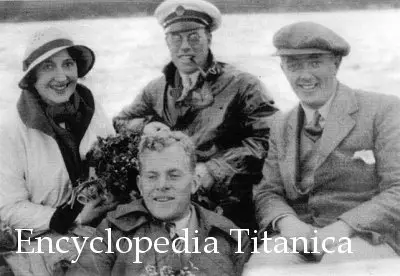
Rita Jolivet and her husband, James Bryce-Allan aboard their yacht, the Scotia in the mid 1930s.
The captain, who is the gentleman on the right side of the frame, ironically bore the last name Turner.
(Courtesy Lawrence Jolivet)
Lawrence Jolivet and his wife visited with Rita, in Nice, during the 1960s. He described her as being “moon faced and happy.” A letter from Rita, written during this era, survives in the Ward Morehouse collection, at the Billy Rose Theatre Library in NYC. Mr. Morehouse had written to Rita enquiring about her Lusitania experiences and asking if the Frohman quote was true; she wrote back, confirming the quote as true and giving an outline of what befell her on May 7, 1915. She stated, emphatically, that the stories later published about the submarine surfacing amidst the debris field were true; she had seen it herself.
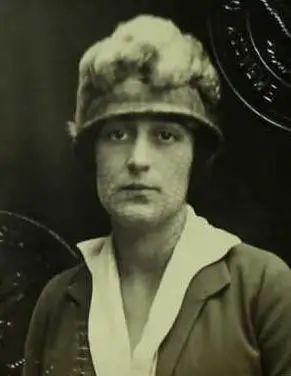
Beatrice Witherbee in 1917
Rita died in surgery on March 2, 1971 after being injured in a fall while dancing. She was demonstrating that she could still dance a jig, when she stumbled and broke her hip. Beatrice Jolivet, upon learning the details of her sister- in- law’s fatal accident remarked, “Oh well, she would go like that.” True to form, Rita’s last words were a lie about her age; “I’m only 77,” although she was actually in her 80s. One of her final films, a surreal French comedy by the title of Phi-Phi (1926) surfaced during the 1990s, and was screened in Europe in 2003 to critical acclaim that doubtlessly would have pleased her.
LEST WE FORGET Rita Jolivet’s magnum opus, her contribution to the “blockbuster” film cycle of 1916-1918, and her most lamented lost film, was the epic semi-autobiographic Lusitania thriller, Lest We Forget.
Rita, and her husband, Count de Cippico, formed Rita Jolivet Productions in 1917 for the sole purpose of bringing Rita’s war experiences to the screen. Six months, $250,000.00 of Jolivet family money, more than one thousand extras, and the combined forces of the United States Navy and War Department were combined to what contemporary critics called spectacular results.
The plot, as determined from various 1918 reviews, was extremely broad, and only marginally related to Rita Jolivet’s actual life. She plays Rita Heriot, famed French opera star, who is loved by an American millionaire and lusted after by a lecherous German diplomat. She works as a volunteer telegraph operator. Captured by the Germans, she is to be shot Edith Cavell style, and refuses to be blindfolded. An Alsatian guard, forced into German service, rescues her when an exploding shell provides a momentary distraction, and she escapes to Holland. The Germans will not admit to this embarrassment and Harry, her American fiancé believes her to be dead and joins the French Army to avenge her.
Rita travels to New York after being told, by the German diplomat who lusts after her and who has pursued her to Holland, that Harry has been killed in action. She becomes the theatrical toast of New York, but when she announces that she plans on returning to London aboard the Lusitania, Baron von Bergen, the German lecher who continues to follow her, warns her not to board the ship. She and Charles Frohman sail anyway. Von Bergen wires information to the submarine. The Lusitania is torpedoed. Great panic reigns, but Charles Frohman remains calm. He remarks, “Why fear death? It is the most beautiful adventure in life.” The ship sinks, hundreds are seen struggling for their lives. The lost liner is shown resting on the sea floor. Frohman is lost, but Rita Heriot survives.
Harry, who is not dead, learns of Rita’s survival but misunderstands and thinks that she is a German supporter. Von Bergen plans to rape and then kill the lovely Rita, to cover up his role in the Lusitania affair. He fails, for not only does she protect her virtue, but she also proves her heroism and patriotism to Harry when she strangles the German diplomat with her own bed sheet. To erase the horrible memories, she devotes herself to war service, and in a hospital, she discovers that Harry is alive and wounded. They are happily reunited at the end.
Rita and Giuseppe forged a vehicle in which every conceivable German atrocity was lavishly re-created. Villages were destroyed. A cathedral was shown being ransacked and then demolished. A German high command banquet, somewhat resembling a melding of Henry VIII and Caligula, and celebrating the destruction of the ship utilized scores of extras and was heavily publicized. A sequence showing a Zeppelin raid on London drew much public comment. Rita herself stood in for Edith Cavell, but survived. The U.S. Army supplied Rita with 300 soldiers, playing “themselves” for authenticity in a battle scene shot in Yonkers, NY. One assumes that a like number of non-military extras were enlisted to play The Huns.
The centerpiece of the film was the extended Lusitania interlude. Rita Jolivet Productions was given “rarely granted permission” by the War Department and the U.S. Navy, to use one of the impounded German liners in New York harbor as a floating prop. These agencies took the step of endorsing both the script, and Miss Jolivet, as “outstanding examples of patriotic ideals.” Rita and Giuseppe commissioned a model of the Lusitania, said by them to have cost $50,000.00, for motion sequences as well as the sinking footage. The German liner, Martha Washington, was used for deck shots, the loading and lowering of the lifeboats, the on-deck panic footage, and the final words of Frohman. The sinking culminated with a shot of hundreds of people struggling amid debris after the ship sank. An overhead platform and over one hundred swimming extras were employed for that one image.
Reviewers praised the “horrid realism” of the sinking sequences, and the most highly praised “haunting” visual effect of the whole film was a tank shot of Rita’s 40 foot long Lusitania model at rest on the sea bed, which was cut to after the mass drowning footage. A 1917 article said, emphatically, that 150 paid extras were used in the water scenes, shot in the Hudson River. The film’s press material claimed 450.
Lest We Forget opened at the Lyric Theatre, on Broadway in New York City, in January 1918. Reviews ranged from favorable to ecstatic. Even the city’s Communist paper, The Call, no supporter of war films, praising it for its relentless emphasis on the horrors of war and its refusal to sugarcoat. Rita Jolivet Productions and Metro Films, which Rita had chosen as her distributor, soon published a small booklet of the film’s rave reviews to distribute to theater owners and critics across the U.S. and Canada.
A few reviewers qualified their raves by saying that although Miss Jolivet was engaging and the Lusitania sequences breathtaking, the bulk of the film was simply too lavish, too frenetic, and too packed with plot contrivances surrounding German atrocities to be 100% satisfying. A blurb from the film’s press book captures much of the spirit of Rita Jolivet Productions’ advertising campaign:
Oh ye of little faith, of faltering courage, who question America’s reasons for waging war against the Huns! Find here the answer to your doubts in this dramatic story of Rita Jolivet, fair daughter of France to whom that well-beloved American, Charles Frohman spoke his last immortal words: “Why fear death? Death is the most beautiful adventure in life!” Lest we forget ~ The Sinking of the Lusitania ~The Rape of Belgium ~The Night Attacks on London ~The Wreck of the Cathedral at Rheims ~ The Upheaval of Russian Democracy WILL AMERICA BE NEXT?
Rita Jolivet, as owner/producer of the film, set out to promote it with characteristic vigor. She appeared in person at all of the major openings, and a surprising number of minor ones. She spoke “plaintively” about her experiences on the ship and “forcefully” about the need for vigilance and patriotism, while carrying her Lusitania life belt and the pistol she had with her on board. The critics were unanimous in praising how “energetic” and “delightful” the “piquant French beauty” was as a speaker, even when the film drew mixed reviews. Count de Cippico announced that he would personally carry prints of Lest We Forget to Europe and distribute them to front line soldiers who were normally isolated from films.
Lest We Forget opened at first run theatres during most of 1918, and worked its way down through the theatrical feeding chain throughout 1919, with its final, brief, reviews appearing in 1920.
It would be wonderful to have the opportunity to see a hugely expensive recreation of the Lusitania disaster starring one of its best-known survivors. The plot seems overwrought and more potboiler than serious entertainment: A title card, displaying dialogue between Harry, the hero, and Von Bergen, the villain, read Yes, she is made to love. But, why marry her? Yet, judging by her surviving performances, Rita Jolivet was capable of contained, subtle, screen acting, and even the least favorable reviews of Lest We Forget stressed that she was compelling in the role and that the film was worth watching if only for her talent.
Critics sated by ‘spectaculars’ released in the wake of Cleopatra and A Daughter of the Gods struggled for adjectives adequate enough to describe the film’s visual and visceral impact. It must be noted that the less enthusiastic reviews all came at the end of the film’s first run, late 1918, when critics and the public were weary of the German Atrocity film cycle that had dominated theaters the previous summer.
An early Pop Culture column in the magazine, Motion Picture World, would explore each month’s ten most frequently asked movie questions, posed by audiences. “Each letter, we realize, represents the thoughts of an additional 600 film goers.” One of the March 1918 questions, asked by several hundred readers, was, “Was Rita Jolivet really on that boat?” The answer: “Yes, Rita Jolivet was really on that boat-and she’s awful pretty, too.”
The film has now been missing for 88 years, but with recent discoveries of several other lost Rita Jolivet movies, hope remains that it might emerge from some obscure archive or private collection and allow a new generation of film fans the chance to experience “The Greatest War Film of All Time.”
Edgar Hounsell
One wonders if movie theater owner Edgar Hounsell opted to bid on Lest We Forget as a feature attraction at his Imperial Picture Palace in West Bromwich, U.K. Hounsell was the manager of the Midlands Exclusive Film Company, of Birmingham. He and his business partner, Edward Barry, were returning from a trip to the United States, where they had been acquiring U.K. distribution rights to popular American films, when they survived the disaster.
The men were in the second class dining room when the disaster commenced. Hounsell described it thusly:
I was having lunch at the time the ship was torpedoed. There were two sittings at luncheon in our saloon, consequently one half of the second class passengers were on deck and the other half below.
So far as I could find out, only one torpedo struck the ship. I have not come across anyone who heard two torpedo explosions. There was a second explosion but that was caused by two of the boilers blowing up. The sound of the torpedo exploding was just a heavy dull thud. Immediately after she was struck, the ship listed over.
All the plates and dishes rolled off the table. The women started to scream. Everything was thrown into confusion, and there was an immediate rush for the upper deck. Had they made direct for their staterooms and put on their life preservers, of which one is provided for every person, I feel sure a great many more would have been saved. I stayed in the dining saloon until the rush had cleared off a bit. Then I went to the deck below, where my cabin was, and put on my life preserver. Mr. Barry did the same.
The electric lights went out just as I was proceeding to my cabin. As quickly as possible, I made my way to the upper deck. When I reached there, most of the boats that could be launched had already got away.
Owing to the big list of the ship. The boats on one side were rendered useless so they could not be launched. It was impossible to stand upright on the sloping deck. We were hanging on like flies, and people were rolling across the deck to the side.
I saw the ropes of two boats get jammed in the blocks as they were being lowered. One end dropped down, and all the occupants of the boats were shot into the water. Women and children were put into the boats first, and a few of the older men.
It was twenty minutes after the torpedo struck her that the ship sank. The torpedo tore a great hole in her side, and the portholes on the upper deck being open, when she listed the sea simply poured in through them. She was torpedoed at 2:10 p.m. and my watch stopped at half past two when I entered the water. As I could not swim, I thought there was not much chance for me, so I lit a cigarette and waited.
As the ship was sinking, I thought I would get clear of the suction, so I jumped off the stern, but the suction pulled me against the side of the vessel and seemed to pin me there. I could not get away and was dragged down with her, but as she sank bows first she also turned to one side. This seemed to release me, or although I went on down, I was not held by the boat. The pressure of the water hurt me, and I had a buzzing sound in my ears.
Suddenly I shot up to the surface again, at such a rate that part of my body came right out of the water. A second but weaker suction took me under again, and when I once more came up there was no sign of the Lusitania. The sea was covered with wreckage, among which people were floating about. I caught hold of a bit of timber, and clung on to that for about an hour.
Then I floated against an upturned collapsible boat, and held on to the side of it. I attempted in vain to climb on top of it, where there were three men clinging, but after a time one of the fellows managed to give me a hand and helped to pull me up.
We had been on this about half an hour when two more collapsible boats, one on top of another floated along. There was no one on them, so we clambered on and put up the canvas side of the upper one. Then by rolling the boat from side to side, we managed to get it to slide off the other one into the sea.
We were now fairly secure, and after we got rid of some of the water we had swallowed, we began to rescue some of the other people who were still floating around. One by one we hauled them into our boat the best way we could, and when a trawler came along we had no more than forty seven people in the boat.
Hounsell also detailed his reunion with Edward Barry:
The last time I saw him was as we dropped off the side of the ship together. I had almost given him up as lost when I did not come across him in the vicinity of where the ship disappeared and, as I learned afterwards, he had the same fear with regard to me. You can imagine my surprise and joy when, on Saturday morning he came to the hotel and we met again. He had been making the rounds of all the places to see if he could find me among the saved.
Mr. Hounsell died in Solihull, England, on January 26, 1947, at age 60.
Edward Barry, described at the time as “one of the best known men in the motion picture world” gave a brief but still interesting account of his experiences:
We were just finishing lunch when we heard a dull thud. Everybody jumped up, and I turned to Mr. Hounsell, with whom I went out to America, and said “That’s a torpedo or we have struck a rock!’ At the time we were in sight of land.
The stewards told the passengers that the watertight compartments were closed. The ship took a terrible list and everything glided off the tables. It was difficult to walk. Women and children started to rush about, and Mr. Hounsell and I went to our cabins and put on our life saving jackets, for everyone realized that the liner was doomed.
We helped a number of women and children to put on their jackets. I was struck by the orderly way in which people acted, the stewards calling out “This way to the boats” just as the man outside a picture house would shout “This way to the pictures.”
Barry and Housell spent some time cutting a collapsible boat free, before climbing the rail and jumping for their lives.
At the very moment I struck the water everything came crashing down from the deck and I was hit in the back. In the hurry, I had put on my life jacket upside down, and that probably saved my life for whatever hit me recoiled off the pad which was still in the middle of my back.
I struck out as hard as I could. There was nothing of the ship to be seen, but I observed various boats. A child floated by, and I caught hold of it and made for an upturned collapsible boat, at the side of which a steward caught my hand and held on until I had sufficient strength to scramble on to it.
Barry found four women on the craft, one of whom was an American widow and another of whom had been injured by debris. He could very well be describing widowed Belle Naish, injured Lady Marguerite Allan, and Rita Jolivet, all of whom drifted together atop an overturned collapsible. The child he attempted to save died of an injury to the left side of the skull.
Edward Barry was landed at Queenstown, and soon traveled on to Birmingham, where he arrived on Sunday morning “none the worse for the wear” except for some cuts on his lower legs.
Dwight Carlton Harris
H.B. Harris’ Kin Safe
Dwight C. Harris, a theatrical manager, who was an uncle of Henry B. Harris who lost his life in the Titanic disaster, is one of those who were rescued after the Lusitania sank…
Dwight Carlton Harris, 31, departed for England that May “in connection with his theatrical business.” He was also to meet with his fiancée, Aileen Foster, daughter of Colonel Sir William Yorke Foster, third baronet. Like many other passengers, Harris passed time during the long delay on May 1st. writing letters and postcards to be mailed from the ship. A letter to his mother and grandmother survives, a light and chatty note in which he observed, among other things, that the Lusitania seemed very small after being on board the Olympic.
Harris wrote to his mother again on May 10, 1915, from Jury’s Hotel in Dublin. He began by describing the disaster as an awful experience that had left him in shock which was only beginning to lessen somewhat as he commenced writing.
Thank God I’ve come safely thru the most awful experience anyone could possibly imagine! I can hardly write about it. I am suffering rather badly from the shock, but fortunately feel better this morning.
The voyage up to Friday at 2 was perfect. I have never seen the ocean so calm. In bad fog Friday morning from 7a.m. to about 11. Superb clear sunny day after. I got up at 11, and read on deck for a while. About 12:30, I went to the Purser’s office and got the package of jewels and money; $500 in gold. I went to my cabin, hung the diamond and pearl pendant around my neck, also the engagement ring and the emerald ring. I pinned the big diamond brooch inside the pocket of my coat, and before leaving the cabin unlocked the canvas bag that had my life belt in it! I put the $500 gold in my trouser pocket, and then went down to lunch!
While at the table, I had a most intense, nervous, feeling come over me, and I got up and left without finishing my lunch. I went to my cabin, took the book, and came out on the port deck. Walked back around to the starboard side; when about half way up the deck I saw the torpedo coming! A white and greenish streak in the water. I stood transfixed.
A moment later, a dull explosion which shook the ship and sent a huge column of water twice as high as the ship; sea water, coal, splinters of wood, etc. came down on our heads. I flattened up against the side of the ship, but got soaked.
I rushed back around the end, and by the time I got to the main entrance the ship was listing well over to starboard. I was afraid to go in, to my cabin, as I thought she was going down; so made for the bow. I climbed over the rail and down on the deck- I could hardly stand, the ship was listing so.
I took off my shoes, and threw away my coat and hat and book. I took a look at things, and decided I must have a life belt, so I climbed up again and rushed to my cabin; secured the life belt I got at Wanamaker’s and put it on, and went down again to the bow.
By this time the water was almost up to the deck. An officer called to me from the bridge to come up, but I shook my head. I got up on the rail, and when the water got right up to the deck I jumped overboard, and swam away from the ship as much as possible.
I was carried the length of the ship, and saw everything that happened. The first lifeboat that was in the water (had) only two sailors in it! They called to me to swim to it, but I kept on. The second boat was suspended, and hanging straight down. Evidently, the ropes at one end had jammed. The third and fourth were crowded with people- I think both of them reached the water safely. The fifth boat upset as they started to lower it, and everybody fell out. I think the sixth boat got safely down.
By this time I was astern. When I was going past the 4th boat, the captain’s bridge was level with the water, and the stern rose rapidly, and the ship plunged forward like a knife blade into the water. Then a great swirling, greenish white bubble formed where the ship went down- which was a mass of struggling humanity, and wreckage. The bubble got bigger and bigger, and fortunately came to within twenty yards of me, shoving wreckage with it.
I was making for an overturned boat when I heard a little boy scream for his father. I swam to him; told him not to cry and to take hold of my collar, which he did. Bravest little chap ever saw! I managed to reach the upturned boat, got the little chap on it with great difficulty, and then got up myself- pretty nearly played out. I could hardly move my limbs, I was so cold.
We were on the upturned boat about ten minutes when some sailors came and took us off in a damaged life raft. We picked up about 10-12 people, but couldn’t take any more as the raft looked like it was going to sink any moment – it was half full of water!
We headed for a sailboat in the distance. The cries for help from those in the water were most awful. Not a ship in sight when the steamer sank; only the little sailboat for which we were heading. I never expected to reach it, as I thought we would sink any moment. One of the undamaged lifeboats got to the sailboat before we did, and put people aboard and then started back; picking us up after we had been on the damaged raft an hour.
Soon afterwards a mine sweeper, the Indian Empire, picked us all up and returned to the scene of the disaster, rescuing a great many. I am glad to say the little chap I found was returned to his mother, father, and brother, all of whom were picked up by our boat.
We started back for Queenstown after 7- ready to dock safely at 9:30. The periscope of a submarine was seen once or twice while we were at the rescue work! But fortunately it did not try to torpedo us, a far as I know!
Fortunately, I did not see the harrowing scenes on deck. There was no panic exactly, but naturally great excitement. The most frightful thing of all was the innumerable dead bodies floating about in the water- men, women, and children!
The first thing I did on land was to cable I do hope you got it soon after hearing the news! I can imagine the horror with which the news was received in the city. I gave in my name at once, and an officer took me to one of the hotels. I could hardly walk as I bruised one of my feet.
The townspeople cleared the street and applauded us as we passed. Every available accommodation was packed. I slept, or rather laid awake, at the Hotel Imperial in a room with six men. One, a Canadian, found his son in the hospital with both legs broken. Another in the same room rescued his sister, but her husband was lost. The scenes at the Cunard office there were indescribable.
Evidently, none of the people, 4 in number, that sat at my table were saved. An awfully nice Englishman and his wife, named Grudge, who lived in British Honduras- they were going to England for a month to see their little girl! Another English lady, Mrs. Watson, who had come from Hong Kong, and a Canadian man, Mr. Chabot, from Toronto. I made enquiries everywhere, but could not find them and their names are not on the list of saved. We all used to play the Characters game, after tea in the afternoon in the lounge, and also that Game of the World! Friends of theirs, Mr. and Miss Painter, used to play, too. Miss P. was saved, but not her father.
Saturday morning, I got up at 8, and went out and bought a suit of dry clothes. I bought a dry undershirt, pajamas, socks and cap the night I landed! I got a blue suit, and a soft shirt and collar, and a rain coat. While I was fitting myself out, a young American about 18 came in to the shop; said he wanted some dry clothes. The shop keeper asked him if he had any money, and when he said no, he was sending him away. So I called him and told the shopkeeper to fit him out, which he did, and you have never seen anyone so grateful. He had such an awful expression on his face, I will never forget it. I asked him if he had hit his face, but he said no, and then I realized he must have lost someone. I asked him, and he said it was his mother. Poor fellow- I thank God you weren’t with me.
I came up to Dublin by the 3 p.m. train, and have been in bed since I arrived, utterly done up. I had the Dr. yesterday- I am stiff from head to foot, and my feet are very sore. I cut my right foot, and it looked yesterday as if it was a bit poisoned so I sent for the Dr. He has treated it, and it looks much better already.
I am going to London tonight. Train leaves 8:10, and I get there 6 a.m. The boat crossing, which I dread, is only 2 hrs and 40 min.
Dwight Carlton Harris had an excellent eye for detail, and an equally good memory. Nearly everything he claimed to have witnessed can be verified through other sources, and most of the people he described identified.
Boat 1 was lowered with only two or three men in it. It later took in survivors from the water, and from the dangerously overcrowded Boat 15. the sequence of boats wrecked, and the sequence of boats lowered successfully is correct, as well.
A letter published in a 1915 Butte, Montana, paper gives a probable identity to the boy Harris rescued. Thomas Henry Richards wrote that when he and wife and three children were thrown into the water from A deck, starboard, in second class, he was able grab one of his boys; Cecil. His other son, Percy, was swept away by the turbulence as the ship sank, but was later found alive. He had been pulled on to an overturned lifeboat by a man who found him struggling in the water, and had been brave, crying only for his father. The Richards’ infant daughter, Dora, was torn away from them when the family was washed overboard, and lost.
Harris was put up in a room in Queenstown with several other survivors. One was a Canadian man, whose son had survived with “2 broken legs”; this was probably George Hook, whose son, Frank, had broken his arm. The man who had saved his sister but lost his brother in law was possibly John Moore, whose sister, Jeanette Mitchell, was rescued but who lost her husband and infant son.
Harris searched for his shipboard acquaintances. He recalled an “awfully nice” English couple named Grudge, en route from British Honduras to visit their little girl in England. This was actually Joseph and Evelyn Dredge. Completing the table were Mrs. Katherine Watson, an English lady traveling from Hong Kong, and Mr. David Chabot from Toronto. All of Harris’ tablemates were lost, as he feared, but Miss Irene Paynter, a friend of Mr. and Mrs. Dredge who would join their games, survived. Her father, Charles, the final member of their group, did not.
The young “American” man Harris met in the tailor’s shop could have been Allan Beattie, 18, Stanley Taylor, 14, or one of the Gardner boys.
As for the claim made in some 1915 newspapers that he was the nephew (or uncle) of Henry B. Harris? The truth of that is undetermined at this time. Dwight Carlton Harris’ father, William, was born in Chicago and was deceased as of 1916. Henry B. Harris was born in 1866, in St. Louis, Missouri. His father was William Harris. Both names are common and there is no evidence, yet, other than the 1915 accounts to bolster or negate the supposition that Dwight Harris’ father might have been William Harris junior, brother of Henry B.
Dwight Carlton Harris’ only on-board acquaintance to survive the disaster, Irene Paynter, died at age 82, on February 14, 1967, in Devon, England. A letter she wrote to the mother of Richard Prichard reveals that Mr. Paynter was evidently killed by a blow to the head.
Percy Richards, the young boy who Harris saved, committed suicide in Cornwall, on June 24, 1949, at age 40.
Dwight Carlton Harris married his fiancée, Aileen, as planned. They resided in England for a time, and after they settled in New York, continued to travel back and forth to Europe; making over a dozen crossings between 1919 and 1939. They had two children. Mr. Harris died in New York City, on December 7, 1970, at the age of 86.
Herbert Light
Herbert Light, actor, was returning to his native Southampton after learning of his mother’s death, when he survived the sinking of the Lusitania. Light was his stage name; his true name was Herbert Light Berks.
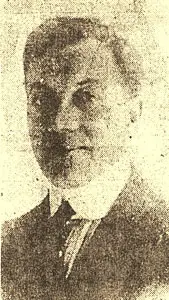
Interviewed nearly a decade later, in his dressing room before a performance, Light spoke of his experiences on May 7th, 1915:
He was in the lounge of the great ship when the torpedo struck the side of the boat and shook it for several minutes. The quivering stopped, and the craft began to sink, and within twenty minutes’ time the Lusitania was completely submerged, he declared. Unable to swim at that time, he held on to the rail of the ship, which came loose. He was soon unconscious and remembered nothing until he was picked up by a sailor manning a lifeboat. He was taken ashore after much difficulty and rushed to a Queenstown hospital where he remained for five days. Light asserted that he recalled the experience as though it happened yesterday. He recounted the pitiful cries of women and children who sought in vain to be saved. He said it was only through unusual luck that he was spared from their sad fate.
Mr. Light subsequently starred in touring productions of Broadway hits, being best remembered for his turn opposite Fay Bainter in East is West. He co-starred with Florence Reed in The Mirage, and in Success with Brandon Tynan. Broadway stardom eluded him, and a search of theatrical databases shows that he never headlined in New York City. He became a vaudevillian at some point in the 1920s, as a song and dance man, and toured the Orient as part of a troupe.
Herbert Light left the stage, and by the early 1930s was operating a florist’s shop in Los Angeles with his partner, Elmer Knott. They left Los Angeles in 1933, and moved to the small town of Quartzite, Arizona, where they ran the El Adobe Inn and Filling Station.
Light later operated a boarding house and restaurant in East Blythe, CA, and was working as the desk clerk at the El Solano Hotel when he suffered an incapacitating illness. He died at his home, in East Blythe, on October 15, 1959. He was 76 years old.
Bert Light, as Herbert was known, was described as a cheerful man with a clipped English accent who was always willing to help out with community theater programs. He became a naturalized U.S. citizen the May before he died; telling friends that he had started the process several times before but had been too busy to complete it. He was cremated and interred at Palo Verde Cemetery. Friends said that Light never failed to mark May 7th, and a 1915 newspaper with a cover story about the Lusitania was found in his personal effects after his death.
John Preston Smith
John Preston-Smith was a member of the Royal Gwent Singers from Wales, but he was not Welsh. He was born in Southbanks, Yorkshire, but as his wife Anne later noted, “He was connected with the ‘Welsh Singers’ for so long, he seemed one of them.”
The Royal Gwent Singers had spent several months touring in the United States in early 1915; performing in the principal cities and giving special recitals before President Wilson, Andrew Carnegie, and John D. Rockefeller. They remained in Brooklyn during March and April, performing in various churches around the borough. There were fourteen singers in all, and they were to have sailed back to England together aboard the Transylvania, but nine of them transferred to the Lusitania. Dewi Michael explained why. “Some of us, too, thought as a matter of fact, that it would not only be more expeditious but safer to travel with the Lusitania.” Survivors remembered the choir standing at the rail when the ship sailed. They sang, “Star Spangled Banner” and “Wales, My Wales.”
The gentlemen of the choir performed in the Lusitania’s concert. Reverend Henry Wood Simpson had brought along his viola and violin and provided their musical accompaniment. Dewi Michael later recalled the final song led by their conductor George Davies. “He was so loved by us… Strangely enough, the last song he sang was ‘Down with the Salamander.’ A strange coincidence that he should have been singing that when he himself would be going down. He sang it well too; I fancy I can hear his beautiful bass voice now.”
The group was at lunch when the torpedo struck. They stayed together only a short time, and then became separated in the confusion. Preston-Smith was with Beatrice Williams and they ran back downstairs to get lifejackets. Miss Williams was placed in a boat and told to get out again.
“The ship was listing so heavily,” she said, “that I had to jump. Mr. Preston-Smith jumped with me and I was picked up and put on a raft.” The end of the Lusitania came quickly and Preston-Smith noted, “I got washed away about 100 yards, and then I got a hold of deck chair on which I rested for about 20 minutes before I got on a raft. I helped four others to get on it, but the raft was over-loaded and began to sink so I took to the water again, as I was the only swimmer. I got on a little iron tank, and held onto that for two hours, though it toppled over several times… It was a Yorkshire man who pulled me out of the water at last, and for half an hour after being rescued, I was utterly helpless. They also pulled out an Irishman named Doyle, who was singing Irish songs in the water. He had gone quite daft. We pulled six women and three men out of the water, and two of the women subsequently died. Whilst swimming towards the raft, and almost done up, a woman swept past me propped up with lifebelts and deck chairs all around her. She asked for assistance, but I was too done up to help her, because by now I had lost the use of my legs. She said she was about done too, ‘But, I am going down like a Briton,’ she added. Just then, a raft came by and picked her up, and all the boys on the raft gave a hearty cheer. They just went crazy with joy at being able to rescue her.
William ‘Spencer’ Hill claimed that he, Thomas ‘Risca’ Williams, William Gwynn ‘Parry’ Jones, and John Preston-Smith managed to get to the same raft and began singing, “Praise God from Whom All Blessings Flow:” I don’t think I have ever heard it sung with more feeling. Then some of the women began to cry and as that would not do, we struck up ‘Tipperary,’ and then they laughed. Spencer Hill may have been misquoted or was incorrect in claiming that John Preston-Smith was with them. Preston-Smith was one of 11 people rescued by the Heron and brought into Kinsale.
John Preston-Smith married Anne and continued to tour with the choir; sometimes together and sometimes in smaller groups. Risca Williams gave lectures on the group’s survival, as late as the 1930s. The Preston-Smiths moved from Wales to Racine, Wisconsin in the 1940s. John had a stroke a few years later that left his right side paralyzed. When Adolph and Mary Hoehling were writing The Last Voyage of the Lusitania, they contacted the couple. Anne dutifully sent the answers to any questions with which John could help, and provided clippings about her husband’s involvement in the disaster. She also noted that they were still friendly with Beatrice Williams Harper, whose life John had helped save, and also with ‘Parry’ Jones. John Preston-Smith passed away on February 9, 1957 and was buried in Mound Cemetery in Racine. Anne Preston-Smith moved back to Wales, and died there in 1973.
Millicent Harwood Hart
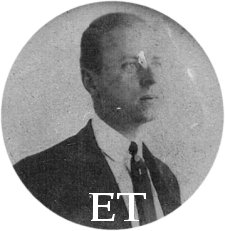 |
|
| Charles Harwood Knight (Nancy Dorney) |
|
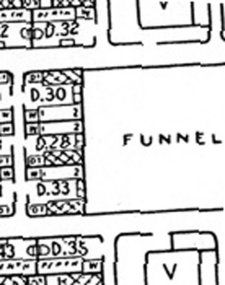 |
|
| Knight Cabins (D-32, Harwood, D-35 Naina) (Courtesy of Paul Latimer) |
Millicent Harwood Hartt, of Dedham, Massachusetts, received a letter posted from aboard the Lusitania by her uncle, Charles Harwood Knight, and aunt, Elaine ‘Naina’ Knight, during the week of May 1, 1915. It was a thank you letter acknowledging the hospitality the Hartts had shown the Knights during their recent visit, and a sentimental keepsake, for the Knights were summering in Paris and would not be seeing Millicent again for some time. Naina had sealed a copy of the First Class passenger list in with the letter, as a souvenir of the voyage they were about to take.
Millicent Hartt, the former Miss Harwood, had been orphaned while in her early teens. Her father died of tuberculosis, and then her mother, who had contracted the disease while caring for Mr. Harwood, died as well. Millicent was sent to live with her only surviving relatives; Charles Knight, known by his middle name of Harwood, and his sister Elaine.
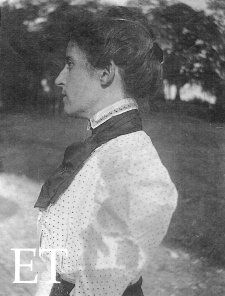
Elaine “Naina” Knight
(Nancy Dorney)
The Knights, both of early middle age (he was 39, she 41 at the time of the disaster) led a genteel life. They were originally from Baltimore, Maryland, but had resided in France for several years, while Harwood studied piano. Harwood gave public recitals, and it is also said that he worked for the piano-manufacturing firm of Sanders and Stayman. Millicent resided with them in until her marriage in 1910, at which point she settled in Massachusetts. She remained in friendly contact with her uncle and aunt although, as the eventual court case pointed out, she received no additional financial support from them after she married.
The Knights returned to the United States, by way of Marseilles, in 1914, and their extended visit ended with a stay at the home of their niece and her husband in Dedham. They boarded the Lusitania intending to return to their Paris flat.
Charles Harwood and Elaine both died aboard the Lusitania. Their bodies were never recovered and no details of their final seven days have eversurfaced; gone without a trace. Millicent Hartt saved their letter, and the passenger list, which remain in the family to this day. She was the sole beneficiary of both estates, and was granted an additional $1750.00 by the Mixed Claims Commission for their lost effects.
Amelia Baker
Amelia “Millie” Baker was another Lusitania passenger with show business aspirations. She had not, at age 27, achieved the same level of success as Rita Jolivet, nor had she garnered favorable reviews to compare to those of Josephine Brandell, but she had completed several years of schooling as an opera performer; studying under Trabadello in France, and Madame Giulia Valda in New York City. Her public debut was to have been in Madrid, in the fall of 1914, but war fears induced her to postpone the performance and return to New York. She was returning to Europe hoping to make her debut at the Opera Comique.
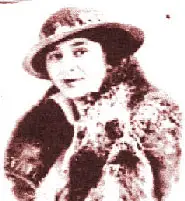
Miss Baker, who had been adopted from a New York City orphanage, grew up in Duluth, Minnesota. She kept in contact with friends and family there, and had last returned home at Christmas, 1914. Friends in Duluth received letters and post cards she mailed from the ship on May 1st. Her widowed mother, Mrs. Alfred Baker, was left with “I want you to always keep this letter, dear, from your own darling Millie” as her daughter’s final words. Millie wrote to her friends that she was eager to resume her musical studies, and looking forward to her public debut. She closed her final letter to her friend, Mrs. Horace Davis, with “By By. Love to all. Millie.”
Amelia Baker was lost in the disaster. Maryann Baker, her mother, collapsed at the news, and remained immobilized with depression. Miss Baker’s friends in New York and Europe promised her mother that they would do all they could to find Millie, alive or dead, but in the end no trace of the aspiring opera singer was ever found. Millie was the sole support of her mother, and it was to her that Miss Baker’s $2000.00 life insurance policy was left. Mrs. Baker was granted $15,000.00 by the Mixed Claim Commission, $14,800.00 of which covered the estimated value of Millie’s lost jewelry and wardrobe.
There was a side of Millie not preserved in the official record, and perhaps not known by her grieving mother. The unknown opera student was traveling in a very select circle, as the only quote we have located regarding her aboard the ship attests:
Presently, a party of us came together: Vanderbilt, C.F. Williamson, a dealer in antiques of Paris and a great personal friend of Mr. Vanderbilt; Edward Gorer, an art dealer of Bond Street; Mr. Slidell, a newspaper correspondent; and a lady known to us all, who lives in Paris, Miss Baker… ~George Kessler
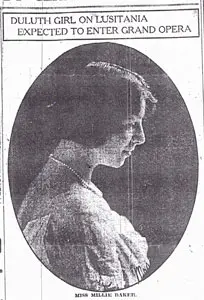
The phrase “A lady known to us all” has a sense of familiarity to it uncommon in 1915 accounts. One cannot imagine it applied, with its mild sexual subtext, to Mary Hammond or Lady Marguerite Allan, by any of the survivors. One notes that in contemporary interviews men were always very specific concerning the nature of their relationship with women other than their wives, mothers or sisters to avoid casting aspersion (“Who was the wife of a business acquaintance” “Who was introduced to me by Mrs. ___during the voyage” “Who sat at my table in the dining saloon” being typical of this) and it seems that Mr. Kessler may have been intentionally casting aspersion. Miss Baker was ticketed with C.F. Williamson, who paid for her passage, and they traveled in cabins that faced one another across the same hallway. They shared the same Fifth Avenue address, and applied for their passports with one another.
C F Williamson
C.F. Williamson, 40, was officially described as being an “art dealer, connoisseur and commissionaire.” He had realized at least $92,000.00 from the sale of a collection he exported to the United States from France in late 1914, and doubtlessly that sum allowed him to live his described ‘affluent’ lifestyle.
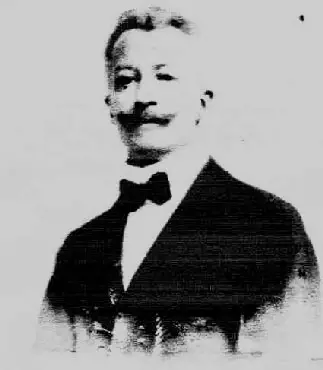
Charles Williamson
Williamson was personally friends with the highest levels of New York society, and his friendship with Alfred Gwynne Vanderbilt had brought him brief notoriety, when he became a player in what was perhaps the greatest scandal of Vanderbilt’s life. Vanderbilt’s mistress, Mrs. Mary Agnes Ruiz, committed suicide in London when things soured between them. Williamson, who was described as Mrs. Ruiz’s “agent,” and who was renting her Paris residence, hurried to London, dismissed her servants, took charge of her affairs and supervised the disposal of her possessions. He gave a deposition at the inquest, but the court sealed the details. The verdict was “suicide while of unsound mind.”
It was discovered after Williamson’s death, that he owed large sums in the form of unsecured loans made by Alfred Gwynne Vanderbilt, George J. Gould, and others. It was also discovered that Williamson died close to broke. His family assumed that he must have hidden his never-to-be-located wealth somewhere outside of Paris, to prevent it from falling into German hands, but the fact that no books or accounts were ever found to document Williamson’s personal or business worth implies that, perhaps, he may have been a charlatan.
The disposal of his estate brought in $140,500.00, which allowed his debts to be paid off at the rate of .82 on the dollar. Williamson contributed to the upkeep of his aged father, and gave generously to the support of his sister, who was married to a terminally ill man. These illustrations of the better side of his nature allow one to suppose that, if they were together during the disaster, Williamson stuck with Millie until the end. However, their story has been lost, leaving Kessler’s odd remark as the final word on the couple.
Abraham Ellis
The Lusitania is best remembered as the shipwreck in which author/philosopher Elbert Hubbard, theatrical producer Charles Frohman, and socialite Alfred Gwynne Vanderbilt lost their lives. Yet there were many more passengers, in all three classes, who could have been described as leaders in their respective fields. Industrialists, actors and actresses, inventors, songwriters, real estate moguls, all found themselves thrown into the same life-and-death situation on May 7th, 1915. Their stories, not widely remembered after 1915, are as compelling as those of Hubbard, Frohman and Vanderbilt.
ABRAHAM ELLIS IS DEAD AT 84; ‘HATCHECK KING’ IN THE 1940’S
said the headline in the July 20, 1985 edition of the New York Times. Abe Ellis had been well known in his day, as a frequently mentioned, behind-the-scenes character in the NYC nightclub and theatre world. He had become wealthy by buying the hat-check concessions in first class nightclubs, theatres and hotels. He paid Billy Rose $10,000.00 for the rights to staff, manage, and keep the profits from the coat room at the French Casino, and expended similar sums in many equally exclusive venues to expand his business. Buried deep in his obituary were the lines:
His big break came shortly after his marriage in 1926 to Yetta Samuel, the daughter of a turn-of-the-century Yiddish actor who died on the Lusitania. Mr. Ellis used $5,000 of his wife’s inheritance to buy the hatcheck concession at the Brooklyn Elks Club.
Abe and Yvette Ellis, whose true names were Abraham and Yetta Samoilesco Ellisburg, had divorced in 1946.
Yetta’s father, actor David Samuels, had indeed died aboard the Lusitania. His widow, Lizzie, had tenaciously pursued a case against Germany before the U.S. Mixed Claims Commission, and each of her surviving children had received a substantial settlement in 1926, making it likely that the facts related in the obituary were correct.
David Samuels
Dave Samuels was a singer and comic Yiddish monologist. He was born in Panciu, Romania, 1877-1880, as David Samoilovici. He gave birthdates of July, 1880, July 15, 1870, and June 19, 1879, on various passport applications.
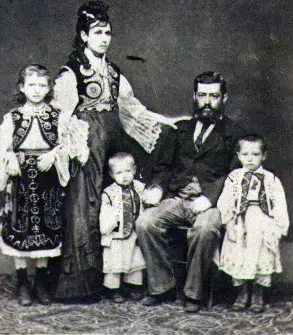
(Courtesy of Peter Berlanny)
He was the third child of six born to Berla and Anna Wasserman Samoilovici. His father was well to do, and ran a store which sold groceries, wine, hats, flour, and imported Parisian shoes. Berla’s granddaughter recalled him as a loving man, as he interacted with her, but also as a tyrant who was feared and respected by his wife and children. She told a story that revealed a softer side of Mr. Samoilovici, in which Berla returned home with a friend late on a winter night to discover an impromptu performance by his sons underway, with eldest son Haim, later known as Leon, playing the violin, youngest son, Jerome, playing the flute, and David singing and dancing. Berla’s eyes reportedly teared up as he watched, and he later asked his friend not to tell anyone about his display of emotion. Berla and his mother had fled Russia, on horseback, around 1848, when he was three years old. He would recall that his mother took him to Romania to avoid his being conscripted into mandatory military service. It is likely that anti-Semitism was a factor in their departure as well. The Samolovici’s beautiful home in Panciu was destroyed by an earthquake in 1940, as was the cemetery in which Berla and Anna were buried. The only surviving link to the family, by the 1970s, was a home for the indigent elderly Berla had endowed; an inscription on its façade still reading The Berla Sam House for the Aged. The structure existed as recently as 2004, but has been renamed and is now a tuberculosis hospital.
It is not clear how, when, or why David Samoilovici left his father’s prosperous and comfortable home. He was living in the heart of the Lower East Side of New York City by the time he was twenty. Virtually no biographical material regarding his teen years has come to light, and the few clues he left in his various passport applications and naturalization forms are contradictory, leaving the story of his journey from “beautiful” house to tenement untraceable.
David Samoilovici would later claim to have immigrated to the United States in November, 1894, from Liverpool, on an unnamed ship. He would also claim to have immigrated in 1901, aboard the Rhodesia, out of Liverpool. His November, 1914, passport gives an immigration date of December 10, 1899, aboard a ship named De Spacia out of London. A 1905 arrival aboard the Lucania showed David as a third class passenger and a recent resident of Manchester. He carried passports as David Samuels, David Samuelesco, and David Samoilesco, between 1909 and 1914. He was 5′ 6½”, with blue eyes, fair hair, a straight nose, and a tattoo on his right arm.
The earliest record of him in the United States is this citation found in the American Jewish Archives, in Cincinnati, Ohio:
Deafmute, or Buried Alive’]. Copied by David Samoilescu, Mar. 15, 1900,
New York. Ms. notebook. 111 pp. Neat hand. 8 1/2″ x 6 3/4″.
His marriage is easier to document. He and Lizzie Finkelstein were married, in New York City, some time between 1900 and 1903. Lizzie was also Romanian, born in Jassy in 1885. She was a singer before her marriage and continued working as one for a time afterward; perhaps performing with David. They first lived at 40 Delancey Street, but as David’s career improved they moved to the more upscale address of 227 St. Anne’s Avenue, the Bronx, NY, and, later, to 430 East 149th Street.
Their first child, Yetta, was born on August 20, 1903, Freida was born around 1904, their son, Julius, who later went by the name of Jerome, was born around 1906, and their youngest child, Hannah, was an infant in 1914.
The one constant in all of David’s papers was the date he became a United States Citizen. He was naturalized, as David Samoilesco, at the U.S. District Court in N.Y.C., on November 22, 1905. Lizzie did not apply, but was impressed with U.S. Citizenship by her husband’s naturalization. They were then living at 40 Delancey Street, on the Lower East Side. David listed actor as his occupation, and his father-in-law and agent, Adolph Finkelstein, of Orchard Street, served as his witness. He gave November 7, 1882 as his birth date, and June 19, 1897 as his date of arrival in the United States.
Virtually none of David’s alleged arrival dates can be verified through Ellis Island records.
Their U.S. citizenship was very important to David and Lizzie, and however vague he was with all of his other biographical details; his naturalization date was always pin-point accurate. A letter from Lizzie survives, requesting a duplicate copy of David’s naturalization certificate, which was lost with the Lusitania; she needed it as continuing proof of her impressed citizenship.
David relocated to London less than two years after becoming a U.S. citizen. He initially resided at 128 Whitechapel Road East, in London, and was represented by the Variety Artists Federation. Lizzie was with him, for a time; they applied for a joint passport in 1909 when they were “Traveling to Roumania to see my (David’s) mother, who is dangerously ill.” Their London address, as of 1910, was 52 Burton Road, S.W. They returned to the U.S. in 1912, aboard the Caronia, and it seems that Lizzie and the children remained in N.Y.C. thereafter.
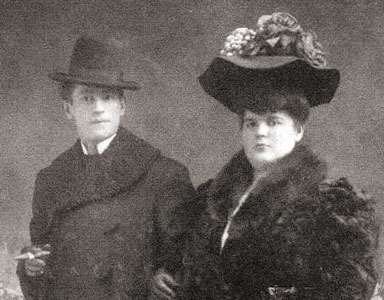
David and Lizzie
(Courtesy of Peter Berlanny)
Lizzie and her four children visited with David in London during the summer of 1914. They returned to the U.S. without him, aboard the Adriatic, in September, 1914. He joined his family in N.Y.C. in October, crossing aboard the Lusitania on her October 3rd sailing. He returned, alone, to his London address, at 18 Charing Cross Road, on the Lusitania’s December 5-11, 1914, voyage; the trip was made under heavy security after a bomb threat. He listed his profession as Music Hall Artist upon entering the U.K.
David returned to the United States for the final time on April 6, 1915, on board the Transylvania. The reason for his visit is not spelled out on his immigration form, but when he boarded the Lusitania on May 1, he was carrying with him a substantial sum of money, amounting to nearly five thousand dollars, as well as much of his personal jewelry. His cash and jewelry would be recovered, and shipped back to Lizzie aboard the Orduna in July.
David was one of the hundreds who died unnoticed, with no survivor later speaking of him in interview or letter. A brief mention of him, in a widely reprinted wire service story about the crowd gathered at the Cunard Line‘s London offices, might have raised Lizzie’s eyebrows had she read it:
Mrs. Cohan, an American woman, sat in the office through the night, waiting for news concerning Dave Samuels, vaudeville artist, who was engaged to a beautiful young girl who sat with Mrs. Cohan.
The brief mention was never followed up, and the truth of the account now cannot be determined. Perhaps it was a mistake, or perhaps the Samoilesco’s marriage had failed by 1915. Lizzie presented her marriage as happy, and rock-solid, in her subsequent claim against Germany and, save for this odd newspaper detail, there is no evidence to suggest that it truly wasn’t.
He was identified, as body #99, and buried, by the Jewish Burial Society, in Cork, Ireland.
The 1920 U.S. census found Lizzie and her children living in Brooklyn, NY. She was unemployed, and keeping a boarder at their residence.
Her claim against Germany, filed in the early 1920s, makes for very interesting reading. Mrs. Samoilesco estimated her husband’s overall worth at no more than $1000 in her original, 1916, claim against Germany. However, when Mrs. Samoilesco filed her second claim after the war had ended, her estimate had expanded a great deal. She claimed damages of $520,000.00, of which $20,000.00 was for lost personal property, including $15,000.00 in lost English gold currency.
She appended an additional claim of $10,050.00 for her own jewelry lost aboard the ship.
“Among her jewels…..was a platinum brooch set with diamonds ($3500.00) a platinum afternoon ring ($1500.00) a solitaire ring ($1000) a pair of earrings ($2500.00) and etcetera.”
The Mixed Claims Commission’s decision on this aspect of the Samoilesco case:
The Cunard Steamship Company returned to the widow personal property found on the body of the decedent, including all of his personal jewelry, some of which he was not wearing at the time of his death. If any inference may be drawn from this circumstance, it is that had the decedent taken with him the valuable jewels of his wife, whom he left behind in NY, they would have been found on his person with his own jewelry. There is no evidence that he deposited any valuables with the purser, and it is highly improbable that he would have placed in his baggage valuable(s) of small compass and weight…..although required to do so, claimant has failed to state from whom any one of these items was purchased or how she arrived at the stated valuations…..calls no one, not even her children, to corroborate her statement that she ever possessed them….or that the decedent took any of them with him…..
And the Samoilesco’s lifestyle? Lizzie testified that he earned upwards of $500.00 per week, of which $300 was allowed to her for personal expenses. She also claimed he sent the family on a $2000.00 two months vacation each summer. The Court ruled:
On his death we find his family living in a New York ‘apartment’ the rent for which, the widow testifies, was either $25 or $35 per month and it is fair to assume in absence to the contrary that their other expenditures were in proportion to the rental paid.
Here Lizzie may have been referring to the long visit she and her children had made to London in the summer of 1914, when she spoke of a $2000, two month vacation.
David’s personal effects?
Lizzie: ….there was lost with him a deluxe wardrobe, including a fur coat, lined with sable and trimmed with beaver collar and cuffs, which he had bought a short time before sailing and for which he had paid $3000.00.”
Court: She does not know from whom it was purchased, and produces no witnesses who ever saw the decedent in possession of such an article either on board the Lusitania or elsewhere.
The court allowed, however, that it could be reasonably expected that David was traveling with the conspicuously up-to-date style of wardrobe befitting a show business personality.
David’s lost gold?
The claimant testified….before the decedent left England for America he took from the safety deposit vault where he kept his valuables a large quantity of English Sovereigns and brought them to NY with him; that ‘he did not change any American money into British money- he brought the British money over here;’ that the decedent had on his person at the time of his death $4,729.00 in American paper currency which was subsequently returned by the Cunard Steamship Company; that this American currency was the proceeds of the English gold exchanged by the decedent on the claimant’s suggestion for American currency, but that the particular sovereigns claimed to have been lost were brought by the decedent from England to America and not exchanged for American currency, and he was taking them back with him. She claims that these 2,500 British gold sovereigns were in a little sack which, according to her best judgment she estimates as weighing three pounds…..the testimony of Lizzie Samoilescu is uncorroborated, conflicting and unconvincing…
The court ultimately awarded Lizzie Samoilesco: $25,000.00. A settlement of $25,000.00, to be divided, was paid to her children, and Lizzie was given a $2000 fee as administratrix of David’s estate.
Lizzie fades from the narrative after 1929. That summer found her mentioned in the newspapers because of a suit filed by her Lusitania claim lawyer. Mrs. Samoilesco felt that the percentage of the settlement money she had legally agreed to pay him was too high, and had declined to honor the agreement. The judge ruled against her and her adult children, but ruled in favor of a reduced percentage in the case of Hannah, Lizzie and David’s youngest child.
Lizzie Samuels lived with a man named Berkowitz, and had a son named Addie with him. She began going by the name of Lisa after she was widowed; a 1915 letter is signed as such, and that is the name by which her descendants know her. She died, of stomach cancer, during the war years. Yetta/Yvette Ellis can be traced further. Her Lusitania settlement money started her husband on the road to financial success. Abe Ellis was frequently in the newspapers, so certain pleasant aspects of Yetta’s life can be documented. She had children. She and Abe wintered in Florida. They owned Oscar Hammerstein’s former Manhattan Opera House, on West 34th Street in New York City.
The Ellis divorce, in the 1940s, was not amicable, and details about it found their way into the tabloids. Yetta apparently kept in contact with the family of David’s brother, Haim Samoilovici. Haim had changed his first name to Leon Berlanny, and relocated to London just after 1900. The Berlanny family has a photo of Yetta/Yvette, looking well-tailored, taken on a 1961 visit to England. Yvette Ellis gave her occupation as “dilettante” when she entered the U.K., aboard the Mauretania, in June, 1957. Family members remember her as a very elegant woman, a scholar of Greek and Latin who spoke with a refined voice, who would take her nieces and nephews to the theater in New York.
Yetta briefly followed in her father’s footsteps, and appeared on Broadway, in the play Rutherford and Son, in 1927.
David’s son Jerome also briefly headlined on Broadway, in the 1930 play The Challenge of Youth.
Jerome Samuelson did not get along with Lizzie’s common law husband, Al, and at the age of 13 he left home to live with relatives. He struck out on his own at age 16, leaving high school and moving into the Y.M.C.A. His settlement money from the Lusitania claim allowed him to survive. He met his wife, Goldie while working as a soda jerk. Relatives remember that he regretted leaving school, but that he continued to study on his own and was very knowledgeable about classical music. He and Goldie lived out their lives in Astoria, Queens.
Hannah Samuelson worked in a bakery. Her extended family remembers her as being a very nice person, but are unsure if shhe ever married or had children.
Archivist Catherine Gerbrands, at The Stage, provided us with an incomplete listing of his United Kingdom performances between 1908 and 1914. Gaps in the record might indicate periods in which he was performing on The Continent or in The United States. David was in Melbourne, Australia, in January 1912. A notice in the Melbourne papers announced that his popular engagement was coming to an end, and alluded to a prior long run in Sydney.
David’s act was almost always favorably reviewed. The focus of his performances seems to have been on comic parodies of popular songs, and comic “Hebrew monologues.” Several of the songs he parodied are named in reviews but, unfortunately, his “clever and amusing” rewrites were never quoted. His comic asides and stories were never quoted from, either, leaving the specific nature of his comedy unknowable.
Mr. J.L. Graydon’s “Lightning Programme,” which is enjoyed by full houses, has several scintillating features this week, a notable newcomer being Mr. Dave Samuels, who has been retained for a further week. Mr. Samuels, who is making his first appearance in England, is a Yiddish vocal and patter comedian, reaching England via America, and he musty be highly gratified by the reception meted to him by the local patrons, who have established him quite as a favourite. Mr. Samuels is distinctly versatile; he can sing- and sing well- tell some good stories, and dance as eccentrically as the best. His opening number is a mock-serious ditty, “I’m An Unlucky Jew,” after which he fires off some several funny stories, and includes in his first efforts a quaint parody on “Love Me and the World is Mine,” which Mr. Dave Carter is popularizing so much just now… Mr. Samuels should soon be busy on this side.
The Stage. October 17, 1907.
He was popular enough, in the final years of his career, to share a stage with Marie Lloyd, and to top the bill, repeatedly, at the London Palladium.
Dave Samuels’ Known Performances
February 6, 1908: Empire (probably in Middlesbrough); April 23, 1908: Regent Theatre (probably Salford.); May 7, 1908: The Pavilion, Glasgow; May 14, 1908: Belfast Hippodrome; May 28, 1908: King’s Theatre, Belfast ; June 4, 1908: Hull; July 16, 1908: The Empress, Brixton; November 5, 1908: The Balham Hippodrome; December 17, 1908: The Palace, Grimsby; March 17, 1910: The Willsden Hippodrome; April 7, 1910: Kilburn Empire; June 9, 1910: Top of the bill at Hull Hippodrome; July 7, 1910: Sheffield; August 11, 1910: King’s Theatre, Edinburgh; September 22, 1910: The Empire, Portsmouth; May 1, 1911: The Holborn Empire. George Robey is on the same bill; January 1912: Notice that David Samuels is finishing his popular engagement appears in Melbourne, Australia, newspapers; February 19, 1913: Hippodrome (possibly Warrington); April 3, 1913: David was one of the top billings at The London Palladium; May 8, 1913: Billed with Marie Lloyd and others at the Royal Hospital Gardens Chelsea on June 3 ; May 22, 1913: Booked by Jack Goodson Limited, for three tours of Moss Empires; May 14, 1914: David was again a top billing at the London Palladium. George Robey was also a top billing; July 23, 1914: Salford Regent; August 31, 1914: Salford Hippodrome; May 13, 1915: The Stage published a notice that David was not on the list of survivors on the Lusitania.
C T Jeffery
Charles T. Jeffery, of Kenosha, Wisconsin, is better known as an interim figure in an automotive corporation whose legacy spanned 1897-1987, than he is for being a Lusitania survivor.
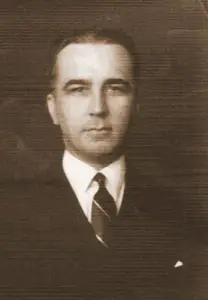
C.T. Jeffery
Charles was the son of Thomas Jeffery, an English immigrant who founded the Rambler Bicycle Manufacturing Company in 1878. The Rambler was the second largest selling bicycle in the U.S. for a time. Thomas Jeffery began assembling the Rambler automobile in 1897, and by 1904 his automobile company was only surpassed in production by Oldsmobile.
Thomas Jeffery died in 1910 and, soon after, Charles T. Jeffery assumed control of the company. Under C.T. Jeffery, Rambler became a public corporation. The Rambler name was discontinued In 1913, and the new, larger, 1914 model was renamed the Jeffery. The car was not a failure, but it did not enjoy the success that its predecessor had.
The afternoon of May 7th found Jeffery in the Lusitania’s smoking room:
When the explosion came, I was in the smoking room of the vessel. It was severe, abrupt, and it seemed as if the ship was raised a little. Directly, she began to list to starboard. All the passengers rushed out on deck. Efforts made to get off the boats on that side were not altogether successful. I saw one boat throw its occupants into the water. We must have been under way at that time, for I saw a woman who had fallen out of the boat struggling in the water.
The crew handled the passengers admirably up to the last. Although most of the passengers went to the starboard side, where the boats were being lowered, I chose the after bridge for, as the ship was sinking by the head, I concluded that this would be the last place above water. And so it was. I didn’t want to jump, for up to this time there was no debris upon the water to which one could hang for support. But a great many passengers did jump at first. The only person who sat at my table who was saved was a young woman from Liverpool. I saw her jump sixty feet from the deck with all her heavy clothes on.
When the ship went down it sank with incredible swiftness. I could not believe that so large a vessel could sink so quickly. I was drawn under probably ten to twenty feet. I have an idea that I did not go any farther down than twenty feet because I think the ship’s bow had reached the bottom at that time. I sank twice, but I had the chance, in the mean time, to get my lungs full of air. It was on going down the second time that I gave up hope. There was not a sign of a boat on the horizon. Persons struggling in the water covered a vast area.
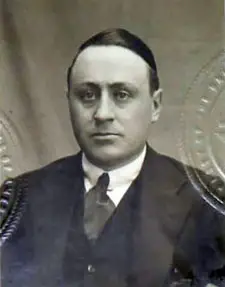
CT Jeffery
On coming up for the second time, I floated around for a while. Then I found an empty can, which gave me some added buoyancy. As I held to this slight support, two men clinging to a cask drifted near me. Later, an old gentleman who looked to be about 75 and a boy of 17 hanging to a plank came slowly towards us.
We kept looking, always, for signs of a ship on the horizon. Once we saw the smoke of a tramp steamer off to the south. None of us would admit that she was not coming our way, yet we all knew that we could not count upon receiving aid from that quarter. Presently we drifted near a partially submerged collapsible boat. It had been stove in, but it was better than the support we had. It took the combined efforts of all five of us to reach it in about twenty minutes ‘though it was only a short distance away.
Our party, supplemented by three men and one woman who had drifted near us, made a load for the boat that kept us in water up to our chests. Thus we floated, while minutes that seemed like hours passed. Finally, a trawler picked us up at 6:10 p.m. Then the trawler cruised around in the vicinity for half an hour, looking for other survivors, but found none. I noticed that most of the people in the water wearing life belts were leaning back in the water, floating without any effort made for possible aid.
My first thought when aboard the trawler was to get warm, so I sat directly over the cylinders. We had no bodies of dead on board, but there was one boy about fifteen who had a broken leg, which was set by a doctor on the trawler before we arrived in Queenstown. Not one of the men I knew on the Lusitania was saved. I particularly regret the loss of a young man of the name of Silver, [Thomas Silva- authors] who was from Texas, and to whom I had become much attached.
Just as the ship was listing and women and children were being put into the boats, I saw a decidedly cool young man of about twenty calmly taking photographs along the deck with a pocket camera. I don’t know whether this young man was saved or not.
A second account by Jeffery gives more details about the time he spent adrift on the collapsible:
At first there had been cries and shouts. Everyone expected that help would come within a few minutes. “When will help arrive?” I heard women floating on their backs calling. Then the cries ceased. People floating on the water’s surface seemed to grow fewer and fewer. How long this lasted, I can’t tell.
The weight of people was making our boat sink lower and lower. One man we rescued weighted, it seemed to us, 25 hundredweight. An enormous, paunchy man, he almost swamped us. We were now up to our waists in water.
1915 proved to be the last year of the Jeffery automobile. In 1916, C.T. Jeffery sold his company to Charles Nash, who expanded operations under his own name. By the mid-1920s, Nash was one of the premiere automobile manufacturers in the United States.
Nash was one of the few independent manufacturers to survive the depression; offering beautiful, streamlined cars in the medium price range that bristled with features unavailable on competing luxury market cars. Nash returned in fine form, post World War II, but styling that grew progressively odder, and crippling competition from Ford and General Motors, doomed the large Nash models. Salvation came when Nash revived Thomas Jeffery’s Rambler. The Rambler was America’s first successful compact car. It offered good fuel economy, and featured quirky styling that many people found cute and appealing in the era of chromed, finned, behemoths. The Nash automobile was discontinued after 1957, but Rambler survived; remaining in production through 1970. The corporation formed by the 1954 merger of Nash and Hudson, American Motors, endured until 1987.
Mr. Jeffery died at age 59, on November 10, 1935, in Philadelphia, PA.
Isaac Trumbull
Isaac Trumbull, 33, was, like C.T. Jeffery, the owner and president of an automobile manufacturing firm. He died aboard the Lusitania, and his car, the Trumbull, died with him.
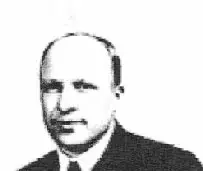
Mr. Trumbull was a native of Hartford, Connecticut. He and his brother had operated the Trumbull Electric Company, of Plainville, and he was the founder, and treasurer of the Connecticut Electric Manufacturing Company. The Connecticut Electric Manufacturing Company outgrew its original plant in Bantam, Connecticut, and moved to an expanded complex in Bridgeport. Isaac, his wife, Bertha, and his teenaged daughter, Priscilla, relocated from Plainville to Bridgeport in late 1912 or early 1913.
Isaac Trumbull drew a yearly salary of approximately $10,000 from his manufacturing firm. He maintained a large number of shares of Connecticut Electric Manufacturing, but his dividend was reinvested into the company each year. Trumbull was an organizer of the American Cycle Car Company of Bridgeport, which was founded in 1913. The first car the fledgling company produced was the Trumbull. A cycle car was, basically, a motor cycle with a closed body and four tires. The Trumbull was an extremely small car, with rather jaunty, for 1913, lines. It was evidently successful enough to warrant a second year of production, and May 1915 found Isaac Trumbull aboard the Lusitania en route to England, where he hoped to open a new market for the American Cycle Car Company and its sole product, the Trumbull.
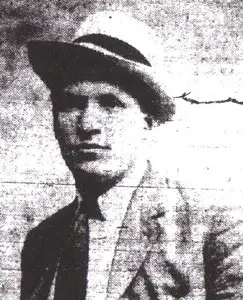
Isaac Trumbull did not survive and, as of yet, no references to him made by any of the survivors have surfaced. His body, #137, was identified and shipped back to Bridgeport, Connecticut. Joseph Trumbull, Isaac’s brother and business partner, issued a press release that was run, in its entirety, in several New England newspapers:
President John H. Trumbull of the Trumbull Electric Company of Plainville, brother of Isaac B. Trumbull of Bridgeport, who lost his life on the Lusitania, admitted Tuesday that the company is seriously considering the manufacture of rifles and other munitions of war for use by the allies against Germany, thus making possible the avenging of the death of Mr. Trumbull. The company is in a position to receive large war orders and the acquisition of adequate machinery to accomplish the manufacture of the implements and incidentally to avenge the death of Mr. Trumbull is being seriously considered. It has received opportunities to bid upon large supplies of rifles, shrapnel, and other munitions of war. The cost of the special machinery necessary is now being figured by the officers of the company. Mr. Trumbull regards the death of his brother and the other passengers on the Lusitania as deliberate murder. He does not believe, however, that the sinking of the vessel is sufficient cause for war on the part of the United States, and is inclined to criticize the naval authorities of England for their failure to have convoys for the ship.
The Trumbull automobile was discontinued before any of the 1915 models were assembled. Bertha and Priscilla Trumbull brought suit against Germany. They established before the Mixed Claims Commission that Isaac had drawn a salary of $10,000.00 per year from Connecticut Electric, and $10,000.00 per year from the American Cycle Car Company. Bertha was able to prove to the court’s satisfaction that she was allowed $6000.00 per year as her household budget. The commission eventually awarded Bertha Trumbull $50,000.00 and Priscilla Trumbull $25,000.00 as compensation for Isaac’s lost earning potential.
The Trumbull electric car was rare when new, but at least two are known to have survived, one of which is on display at the History of Trucking Museum in Middletown, Connecticut.
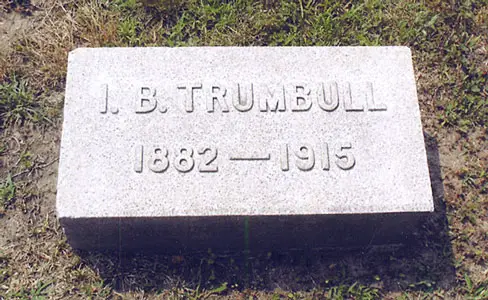
Albert Perry
Albert Norriss Perry was another Lusitania passenger with ties to the fledgling automotive industry. His future looked bright in May 1915. Perry had been in the auto business, in London, since 1903, and he had just secured a position with Pierce Arrow, one of the top three luxury car companies in the United States.
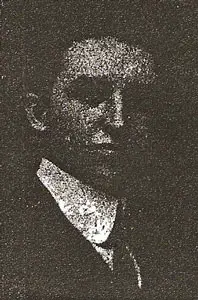
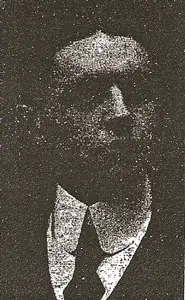
Albert and Frederick Perry
Perry was born at home on May 17, 1889, at 31 Mayton Street, Islington. His father, Charles, was a prison warden and his mother, Julia Norris Perry, stayed at home to look after the small but growing family. Albert left school at the age of 14, and started working at Messrs Napier & Son, Motor Manufacturers of Acton Vale and New Burlington Street, London. He had become a Sales Manager with the firm by 1910, and visited America for the first time that year. He met and became engaged to 26 year old Jessie Couper, of Gretna Vale, in 1911, and on June 15, 1912, they married in the Parrish of East Acton, Middlesex. Their only child, Ruth, was born at home on February 26,1914.
Perry remained employed by Napier, and by the time the couple moved to 51 Grafton Road, Acton, Albert was already one of their most popular Sales Managers. Napier & Son, while continuing to manufacture motor cars, also began producing aero engines on behalf of other companies.
Albert sailed to America, in early February 1915, accompanied by his younger brother Frederick “Fred” Perry. Their destination was Buffalo, New York, where Albert would take up a position with the Pierce Arrow Company. Pierce Arrow, along with Packard, was America’s leading producer of hand-assembled luxury cars, and was endowed with an aura of prestige equivalent to that of Rolls-Royce.
The brothers boarded the Lusitania, destination- Liverpool, on May 1st. Albert N. Perry was to reunite with his family, and his wife and daughter would be returning with him to America on the Lusitania‘s next voyage, on May 15th.
Albert Norriss Perry drowned, but his brother, Frederick John Perry, survived and gave his account of the disaster to a reporter of the Acton Gazette on May 14,1915:
Both my brother and I were returning from the states together. Before we left New York we read in the papers the notice issued by the German Ambassador, and as everybody else did, we pooh poohed the idea of the vessel being torpedoed. There was a general discussion of the matter throughout the whole of the morning. There was a great crowd at New York to see us all off, and as the ship began to move away from the landing stage the splendid Welsh choir which had been touring the States sang to their friends on shore.
That and all the following days up to the day of the disaster were beautifully sunny. We had a very good voyage over. On the Thursday evening before the sinking of the vessel, we had the usual weekly concert among the first class passengers and after a splendid entertainment by the Welsh choir, the chairman, who was one of the director’s of Messrs Vickers, made a splendid appeal for the Liverpool Sailors Orphanage and referred to the dangers through which we were passing. He said that he was quite sure that every man, from the Captain down to the stokers would be willing to lay down their lives for the passengers if need be. This resulted in a record collection at these concerts for the Liverpool Orphanage.
On the following morning, quite early before anyone was about, the fog horn was sounding and it continued sounding up to 12 noon. It certainly was misty, but in view of the danger zone we were in it seemed a trifle absurd to blow the fog horn furiously as they were doing. At noon it cleared, the sun shone beautifully and one could see for miles. The south coast of Ireland was well in sight. At one o’clock the lunch bugle sounded and everyone went down to lunch.
My brother, an American friend who was traveling with us for his health and who intended to return with my brother on the Lusitania next Saturday as my brother was taking up a permanent position with the Pierce Arrow Co, were lunching with me, and as we were finished quite early we went up several decks to the lounge for a smoke. It was then ten minutes to two. Shortly after two o’clock, just before the people began to get up into the saloon there was a terrible impact, marked not so much by the noise as the force of the explosion. It shook the vessel from stem to stern as though we had struck a rock or collided with another vessel. We immediately realized that we had been hit by a torpedo.
Our American friend was not with us at the time, but my brother and I walked through the lounge to get down to the boat deck. We were met at the entrance to the lounge with a fearful volume of smoke and steam, caused by the explosion, which apparently had reduced the speed of the ship very suddenly. Before we could realize the position, there was a second shock, which came within a minute or two of the first. By this time there were many people coming up the stairs from the lower decks and the dining saloon. We managed to get out onto the boat deck, which was then very crowded, considering the majority of the people had been in the dining saloon. Most of the people appeared to have come from the second saloon over the communicating bridge. My brother and I then got separated, nor did I see our American friend, Mr. Brown who had gone down into the library after dinner to write some last letters before landing.
I walked to the starboard side and helped people get into the boats. One boat was being lowered, but when it was nearly half way down one end seemed suddenly to stop, and the other end continued with the result that the people – between fifty and seventy of them – were simply shot out, like coals out of a sack, into the water. The boat then followed them down to the water, stern foremost, and thus immediately began to fill with water. The bows seemed to be held fast by the ropes, which were still over the davits. The boat thus lay useless alongside the ship.
Another boat further along towards the captains bridge was lowered a few seconds afterwards and when nearly down to the water it appeared as though it was going to behave as the first had done, but righted itself and reached the water safely There were not more than half a dozen people out of the previous boat within reach of the second. They were told to catch hold of the second boat, but I did not see whether any managed to get in or if I did see, I don’t remember it. I remember that one of the difficulties of lowering the first boat was that an iron ring had jammed round a staple and one of the crew could not release it.
I jumped into one of the boats to help in releasing the ropes preparatory to filling it with the women who were round, when I suddenly heard a cry “All out of the boat”. Looking round I saw an officer on the very top deck of all, but could not hear his orders distinctly. Immediately we jumped out onto the boat deck and then it appeared that the ship was simply righting herself, probably through the water finding its own level, and I suppose the watertight doors were closed. I then saw my brother for the last time, away towards the captain’s bridge and near the lounge entrance. I notice he was, like myself, fully dressed, but had on a lifebelt of the kind supplied in each cabin. I asked him where he had obtained it, and he said, “Inside the main entrance,” I looked in and found there were a large number of saloon passengers there, all with belts on, including some of the ships officers. Not seeing any belt lying about and not caring to run the risk of going down to my cabin and being caught like a rat as the ship went down, I went on deck.
Then the ship made another lurch to starboard, the side on which it had been torpedoed. With this I made for the boat deck again. I obtained one of the white cork life-belts, but gave this up later to a boy of about eight who was running along the deck and put him into a boat. The ship was now sinking fast. It appeared to me we should never get a boat away and that even if we reached the water, the ropes would not be detached. I decided to wait until the water reached a certain porthole and when it was a case of “everyman for himself” to dive overboard. This I did from the port side which was of course very high in the air. I dived striking the boat which had previously emptied the people into the water.
After an awful struggle in the water too awful to describe I came to the top fighting for something to get hold of. After a few seconds I saw a boat near me and immediately made a plunge forward to get hold of it, but was quickly pushed off by some stokers, who declared “There’s no room for a single person.” I was thus back again in the water, but made a second effort to get hold of the small ropes looped round all the boats. I gripped so tightly that you can see the marks on my fingers now. Thus I was pulled along by the boat for some considerable time. When I was giving out I put an arm through one loop for better support.
I was taken out of the water about 4.30 pm, having been in it for two hours according to the time at which my watch had stopped. I was rescued by a small fishing boat, and the fishermen were very kind, giving me some hot tea. After waiting for about an hour, we were taken off by paddle steamer and arrived in at Queenstown at 9.20pm. We were very kindly treated there and I was taken to the hospital. I should like to say that there was no panic at all.
When I saw the people on the boat deck everyone seemed to be struck with grief rather than fear. Ladies and children were crying, but not screaming. This was really marvelous to me considering the time the people had been thinking what might happen to them. No, I cannot say whether the little boy I spoke of was saved or lost. Nor do I know if a gentleman I knew, Mr. Nedbury, (Medbury-author) a Surrey man was saved, but I do not see his name on the list of survivors. I did not see the ship go down, but I think it had gone when I came to the surface. I seemed to be an awful time fighting in the water, but after I had risen the second time I seemed to know that I had got to strike out. I can only just swim and could not have reached the boat if it had been any distance away. My elder brother, Norriss is an excellent swimmer, I never saw him again after he was at the lounge entrance. I have heard today that his body has been recovered and is being sent over from Queenstown to Acton for the funeral which will take place at St. Dunstan’s Church and Acton cemetery, if possible on Saturday afternoon.
I returned from Queenstown only today. I have been lying in the Queen’s Hospital Queenstown, with a broken collar bone, bruised legs and arms and a bad back. My brother Harry, though he had no address to work upon, came over to Queenstown to find me and brought me back at three o’clock yesterday afternoon and we arrived at Euston at six o’clock this morning. I have been examined by a local doctor and I think I am fortunate to get off so lightly. It is appalling to realize the exceptionally large number of women and children who have been brutally sent to their deaths by a country calling itself civilized.
Albert Norriss Perry’s body was one of seven recovered by the skipper of a trawler and brought ashore at Castletownshend. The bodies were move to Queenstown, where Perry was identified by the contents of his pockets. Observers noted that Albert’s eyes were closed but swollen, indicating some sort of blow to the head. Albert Perry was listed as body #162:
Well dressed male, 30-35 years old, 5’10, and clean shaven. Auburn hair, stout, wearing a pale green suit, white shirt with black stripe, brown golf shoes. Property: Diamond ring on finger, invest pocket a gold half hunter keyless watch-stopped at 2.35pm attached to a gold kerb chain, small links, I leather sovereign purse containing 2 gold sovereigns plus £8,10s in English currency and $180.00 in dollar bills, and two 1st class tickets from Liverpool to London and a silver cigarette case bearing an inscription showing that it had been presented to him by “a few colleagues of Messrs. D Napier and Son” and dated Xmas 1914, some letters were also found on him, one addressed to Mr. G.F. Heath, Heaths Garage Ltd, John Bight Street, Birmingham, and another addressed Gerald Dugdale Esq., 8 Market Place, Manchester.
Albert’s body was returned to Acton on May 14th, with his funeral taking place the next day at St Dunstan’s Church. The internment followed at Acton Cemetery, next to the small chapel by the entrance gates. Those in attendance included his widow, Jessie, his parents, and his brothers, John and Harry.
An application for probate was granted on July 19, 1915, on behalf of his widow and daughter. Albert’s estate was valued at £10, 493, 14s, 4d.
Jessie Perry’s younger brother, James, died on June 6, 1955,. Albert’s grave was reopened and her brother interred with him. Frederick John Perry continued to work for Napier & Son until his retirement. Frederick moved to a nursing home in Sunninghill, Berkshire after the death of his wife, Violet, and passed away peacefully on January 25, 1971 aged 85.
Napier & Sons continued to produce motorcars until 1924 when it switched production to aircraft engines, eventually closing its doors in the early 1960’s. Pierce Arrow maintained its reputation for flawless, hand-crafted luxury, but ultimately could not survive the Great Depression. A handful of 1937 models were assembled, and it is possible that one or two 1938 Pierce Arrows may have been produced before the company vanished.
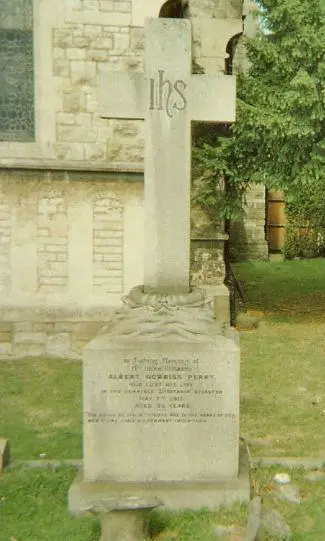
Albet Perry’s Grave
Anne Shymer and others
William Uno Meriheina, profiled earlier, was a race car driver who had parlayed his career into a job as a General Motors Export employee.
Edwin Twinning, 19, of New York had worked as a mechanic specializing in race cars and, in that capacity, frequently traveled. He sailed in third class aboard the Lusitania, and vanished without a trace; his body was not recovered and no one who knew him on board left an account mentioning him.
Anne Shymer, 36, of New York City, was the president of the United States Chemical Company. She was aboard the Lusitania en route to London, where she was to be presented to King George and Queen Mary at the Court of St. James.
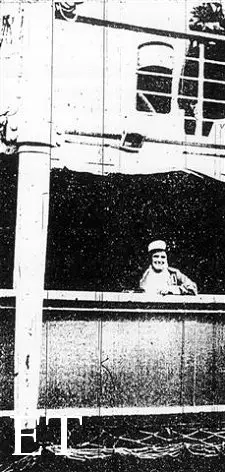
Anne Shymer photographed by her family aboard the Lusitania. May 1, 1915
Mrs. Shymer was born in Logan’s Port, Indiana on May 30,1879. Her mother, Grace, made sure that Anne and her younger sister, Maibelle, were well educated, and she encouraged Anne’s interest in chemistry. Anne studied at Cornell University, and she likely transferred to, and graduated from, another institution for Cornell does not have her recorded as a graduate. She was married to a man named Paterson for a short time and lived abroad until he died.
Anne returned to the United States and continued her experiments in a private laboratory in New York. She remarried on January 16, 1911, to Robert Shimer. They lived together as man and wife for a period of four weeks and then separated. He took off for parts unknown, and she anglicized her last name to Shymer.
Anne was a successful chemist, and formed the United States Chemical Company. She discovered formulas for textile bleach, and invented a germicide intended for hospital use. Anne presented her discoveries to King George’s physician in early 1915. She dined with Premier Asquith, and his wife, during her London visit. Anne returned to New York to make final preparations to expand her company’s business in London. The chemist joked with friends and family that she was to be presented to the King and Queen, “Scientifically if not, socially.”
Anne had returned to the United States aboard the Lusitania, and chose to sail back aboard her as well, because it had been such a pleasant crossing. She carried her formulas with her. Her family came down to the pier to see her off, and photographed her aboard the Lusitania, standing on the B-deck promenade, near her cabin, B-98. She had not been able to locate her husband, and commence their divorce proceedings, before she sailed.
Her actions aboard the Lusitania are unknown; however, when the ship was struck, she may have gone to her cabin to retrieve her jewelry. Her body was among the first recovered, and was numbered 66. The jewelry found on her remains was estimated to be worth $3,900. It was handed over to Mr. Thompson, a Vice-Consul at the American Consulate, Queenstown, but was lost in transit between Cork and the American Embassy in London.
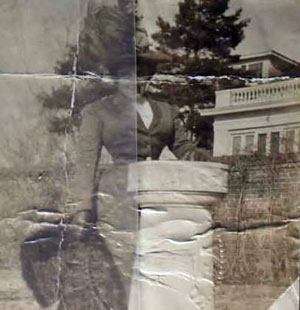
Anne Shymer
Anne Shymer’s remains were sent home on the steamer Philadelphia. Grace Justice-Hankins and her daughter, Maibelle Heikes Justice, filed claims against Germany for lost property, and for the formulas that Anne was bringing to London. Robert Shimer learned of his wife’s death and filed a claim for $50,000. Grace Justice-Hankins passed away in 1924, before a judgment was made. Commissioner Edwin Parker immediately dismissed Robert Shimer’s case, for he and Anne had not lived together as husband and wife since 1911. Parker noted that since the chemist had not filed for a patent for her inventions, he could not award her estate any money for them. He rendered his decision on October 30, 1925 and granted her estate, which had previously been awarded $3,900 for the missing jewelry, an additional $7,525.00. Her mother’s estate received $7,500, as did her sister Maibelle.
Anne Shymer’s sister, Maibelle Heikes Justice, was a successful author and screenwriter. May 1915 found her in Los Angeles, where she received a happy letter, from her mother, describing Anne’s departure.
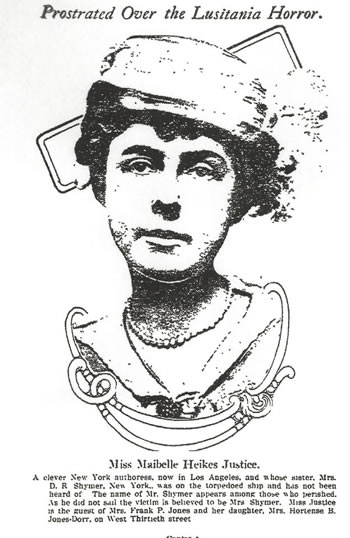 "The letter came but a few minutes before we heard of the terrible fate of the Lusitania. It was such a happy letter. Mother tells me how sister was overjoyed at meeting an old friend who was in Mr. Vanderbilt's party. It was a jolly crowd.
"The letter came but a few minutes before we heard of the terrible fate of the Lusitania. It was such a happy letter. Mother tells me how sister was overjoyed at meeting an old friend who was in Mr. Vanderbilt's party. It was a jolly crowd.
The ship was delayed in starting. Mother stood on the pier and sister leaned over the railing. The sky was overcast. Just as the gangplank was going up, a messenger boy ran on the dock and, dashing up to Mr. Vanderbilt, handed him a note. It was a note of warning, telling Mr. Vanderbilt not to sail at peril of his life.
Mr. Vanderbilt laughed quizzically and showed it to the rest of the party. At that instant, the sun burst forth. It played directly on my sister, Anne. Mr. Vanderbilt laughed, and declaring it was a good omen, threw the anonymous letter away.
The picture of my sister Anne standing there with the sunrays shining directly on her, was the last my mother saw of her. We have had no good news, nothing but messages telling us to keep up hope.
I am sure my brother-in-law was not on board, or my mother would have mentioned it in her letter. And I think he is busy right now on some proposition that would have kept him from sailing.
The ship's records have his name, but not my sister's. They must mean Mrs. R.R. Shymer, and not her husband. She is reported as missing, and there is very little hope for any of the passengers that have not been saved already.
Anne was starting for London to organize a branch office for a large chemical concern of this country. She is a university graduation widely known as a student of chemistry.
Maibelle Haikes Justice wrote films for stars such as Tom Mix, Mary Miles Minter, and Buck Jones. Her career in Hollywood ended around 1920. She died at age 54, in 1926.
A second inventor traveled aboard the Lusitania, but his intent was considerably less benign than that of Anne Shymer. Henry ‘Harry’ Pollard was returning to England with a formula for poisonous gas to offer to the British government.
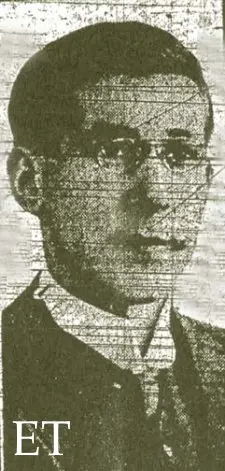
Henry Pollard
(Michael Poirier)
He was born in Bradford, one of several children of Mr. and Mrs. of Edwin Pollard. The family moved to Old Corn Mill, Silsden where spent most of his childhood. He was educated as an engineer’s draughtsman. He was also an inventor and was said to have obtained several patents. One of his later discoveries involved the use of liquid ammonia in the manufacturing of ice.
Pollard left the United Kingdom, in 1914, to work on projects in the United States. He traveled aboard the Transylvania, which arrived in New York on December 16, 1914. His destination was Washington D.C. where he was to stay with an acquaintance named Middleton and work in the Victor Building.
Henry was installing machinery for an ice plant when an explosion occurred. It left several men unconscious and another near death. The cause of the explosion intrigued Pollard, and while investigating its origins, he believed that he found something that could help offset the effects of the gas bombs used by the Germans. He spent much time refining his discovery, and as he did so, the nature of its potential changed. Pollard began refinining his discovery for use as a weapon, and when he was done, he believed that it would prove to be far more destructive than anything invented by the Germans. He booked first class passage on the Lusitania, determined to offer his formula to the British government.
Henry Pollard’s plans to help in the war effort were not to be, for he was lost in the shipwreck. His brothers Frank and Lewis traveled to Ireland, but despite their relentless search, they found no sign of Harry. The exact nature Pollard’s discovery has not been preserved; his notes were apparently lost with him. However, his work immediately before the disaster investigating the explosive potential of refrigerant ammonia suggests of what his gas weapon may have consisted. Although one regrets the loss of Mr. Pollard, it is perhaps for the best that his discovery was never utilized.
Albert Bilicke, pioneer, successful Los Angeles real estate developer, and Lusitania victim, has survived to the present as a minor character in every book written about the O.K. Corral shootout.
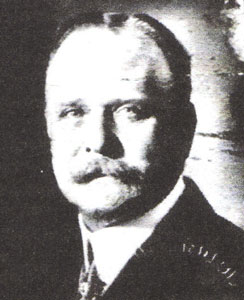
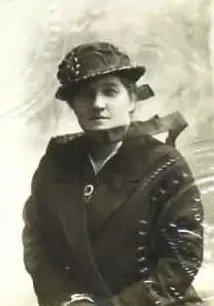
Albert and Gladys Bilicke
Albert Bilicke’s was a success story straight out of the Old West. He was the son of German immigrants, who settled in the boom town of Tombstone, Arizona. Albert and his father opened and operated the Hotel Cosmopolitan during the mining years, and the family prospered. Albert became friends with Wyatt Earp and his family, and testified on Earp’s behalf at the infamous trial following the gunfight at the OK Corral. Bilicke swore at the trial that he saw Tom McLaury, one of the outlaws killed in the shootout, with what appeared to be a gun in his pocket. Albert was no stranger to violence, having once shot and killed a man who threatened his father with a gun.
The Hotel Cosmopolitan burned, and the Bilicke family moved on to California. Albert operated a hotel in Santa Rosa, and then went on to Los Angeles where he ran the Hollenbeck Hotel. He met and married Gladys Huff, of Illinois; 1915 newspaper accounts claimed that she was his private secretary. Albert Bilicke began plans for his most ambitious project,the Alexandria Hotel in downtown Los Angeles, shortly after his marriage, Ground was broken for the new edifice in 1904 and it opened a year later, soon becoming one of the leading hotels in California.

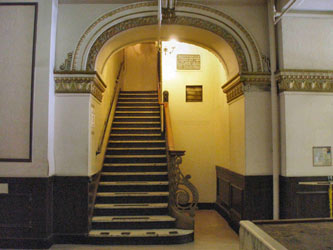
Alexandria Hotel
He next formed a partnership with R.A. Rowan, co-founding the Bilicke-Rowan Fireproof Building Co. They built the Rowan Building and bought many properties in downtown Los Angeles. Albert began investing in property in Kansas City, Missouri, where his holdings were reported to be over $1,500,000.
The Bilickes had three children: Carl, Albert, and Nancy. Their home was 699 Monterey Road in South Pasadena, California. Friends and acquaintances received a lasting impression of beauty and permanence when they visited the estate. The house stood amid orange groves, and the lawns behind the house were terraced to a height of 50 feet over their residence. Below them, the valley rolled away to a view of the distant ocean.
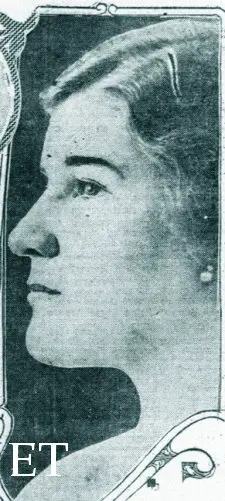 |
| Gladys Bilicke (Michael Poirier) |
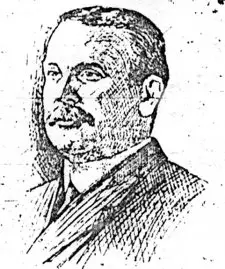 |
| Albert Bilicke |
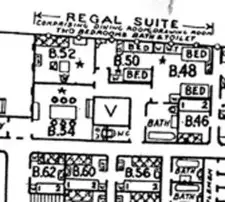 |
| Bilicke Cabin (B-48) (Paul Latimer) |
Albert became ill and needed abdominal surgery in early 1915. His physicians advised that he and Gladys should take a short, recuperative trip. Their short journey was cross country, terminating in New York. En route, they visited with friends and relatives in a number of cities. They stopped in Kansas City for a few days, and intended to return in time for the grand opening of the elegant Muehlenbach Hotel.
They decided, while in New York, to cap off the pleasant short trip with a voyage. Albert sent a telegram to his real estate agent, C.H. Barber, saying: “Too strenuous for me here. Am sailing on the Lusitania.” Barber did not like this turn of events at all and wired back to the Bilickes that they should not sail. It was too late: the couple had booked cabin B-48 and were ready to depart.
Albert wrote a postcard to his friend, Leonard Brown, while waiting for the ship to sail: “We are off and this is certainly a fine ship. Have crossed twice in her and am acquainted with her speed and officers. Expect to get much rest from this trip…”
The couple was resting in their cabin, after lunch, when the ship was struck. They made for the deck. Gladys and Albert entered a lifeboat, supposedly the first from the starboard side to be overturned while lowering. According to their grandson, Gladys fought her way to the surface and grasped at some floating wreckage. The family lawyer confirmed this in an interview, and said that she held onto a spar with several men. She scanned the ocean for any sign of Albert, but could not see him, and surmised that he may have been trapped underneath the wrecked lifeboat.
Several hours later, Mrs. Bilicke was brought to Queenstown. She did not rest: she later told her grandson that she spent hours walking from place to place looking at bodies, trying unsuccessfully to find her husband. A description of Mr. Bilicke was given to the American Counsel in Queenstown based on Gladys’s memory of what he was wearing that day:
Age about: 53. Height: about 5 feet 6 inches. Eyes: blue. Hair: sandy and thin. On abdomen, 2 scars from operation. Clothes: Suit, dark material. In the pocket, wallet with gold mountings containing English money and papers. Little notebooks in pockets. Watch and chain, gold and platinum. On watch is monogram, A.C.B. Ring, turquoise and two diamonds. Underwear: Linen mesh, short and drawers. Abdominal belt, silk hose, caught up with gilt clasps. Shirt marked on sleeve by monogram “A.C.B.” and back of shirt marked “Sulka & Co., Paris & New York.” Cuff buttons set with light blue sapphires. Collar, white turnover. Neck tie, dark. Stick pin, emeralds surrounded with diamonds.
Third class passenger, Miss Violet James, of Edmonton, Alberta described meeting Mrs. Bilicke, in a surprisingly insensitive letter:
I came along with a party of survivors to London. One of the first-class passengers, an American woman, lost her husband. She hung on to me all the time and she got on my nerves. We went to the Ritz, and she pleaded with me to stay, but feeling as I did, I couldn’t, for I wanted sleep. My throat sore – limbs aching. I brought her up, looked after her all along, and considered I had done my duty. However, I hadn’t left her long before a special messenger called me back, but my doctor came to my rescue and ‘phoned saying I was too ill and must stay in bed for a few days. He came to see me twice yesterday and again today. I have promised Mrs. Billick (sic), to return with her to Los Angeles, California, within the next month, so I shall have to pay you a rush visit. We sail under the American flag next, and will make sure of it, too.
Mrs. Bilicke eventually abandoned her search and sailed for home on the Philadelphia; arriving in the United States on June 3, 1915. She was met in New York by a maid and a nurse, and from there returned to California and her family. Her sister, Ella, went to Chicago to meet Gladys’ train. Mrs. Bilicke’s told Ella of the greatest fear she experienced while awaiting rescue, which was that she suspected she was being carried out to sea by the strong current.
When Mrs. Bilicke arrived in California she was surprised, not pleasantly, to learn that her husband’s will had been probated and that her sister-in-law, Louisa, was fighting for a share of the estate. Albert’s will was settled in 1922, with his wife and children prevailing. They received $3,521,540.00.
Gladys filed claim against Germany before the Mixed Claims Commission. She had been injured in the disaster, sustaining sustained several abrasions on her head and contusions on her body, although it was mainly for loss of support that she was claiming. The court noted that her husband’s net worth, in 1891, was about $16,000, and that at the height of his career, Bilicke was worth $2,706,864. Judge Edwin Parker awarded Gladys $50,000 and each child was awarded $30,000.
Mrs. Bilicke remained active socially, and maintained a residence on West Adams, a fashionable street in Los Angeles. The Lusitania was rarely mentioned in her presence, and she would only talk about her experiences in the disaster with great reluctance. She passed away on March 3, 1943 at age 77.

